Descriptive Essay Writing

Descriptive Essay Examples

Amazing Descriptive Essay Examples for Your Help
Published on: Jun 21, 2023
Last updated on: Mar 1, 2024
-8521.jpg)
People also read
Interesting Descriptive Essay Topics - 2024
Writing a Descriptive Essay Outline - Tips & Examples
Descriptive Essay: Definition, Tips & Examples
Share this article
Descriptive essays are very commonly assigned essays. This type of essay enhances students' writing skills and allows them to think critically.
A descriptive essay is often referred to as the parent essay type. Other essays like argumentative essays, narrative essays, and expository essays fall into descriptive essays. Also, this essay helps the student enhance their ability to imagine the whole scene in mind by appealing senses.
It is assigned to high school students and all other students at different academic levels. Students make use of the human senses like touch, smell, etc., to make the descriptive essay more engaging for the readers.
On This Page On This Page -->
Examples make it easy for readers to understand things in a better way. Also, in a descriptive essay, different types of descriptions can be discussed.
Here are some amazing examples of a descriptive essay to make the concept easier for you.
Descriptive Essay Example 5 Paragraph
5 paragraphs essay writing format is the most common method of composing an essay. This format has 5 paragraphs in total. The sequence of the paragraphs is as follows;
- Introduction
- Body Paragraph 1
- Body Paragraph 2
- Body Paragraph 3
- Conclusion
Following is an example of a descriptive essay written using the famous 5 paragraph method.
5 Paragraph Descriptive Essay

Get More Examples From Our AI Essay Writer
Descriptive Essay Example About A Person
Descriptive essays are the best option when it comes to describing and writing about a person. A descriptive essay is written using the five human senses. It helps in creating a vivid image in the readerâs mind and understanding what the writer is trying to convey.
Here is one of the best descriptive essay examples about a person. Read it thoroughly and try to understand how a good descriptive essay is written on someoneâs personality.
Descriptive Essay Example About a Person
Descriptive Essay Example About A Place
If you have visited a good holiday spot or any other place and want to let your friends know about it. A descriptive essay can help you explain every detail and moment you had at that place.
Here is one of the good descriptive essay examples about a place. Use it as a sample and learn how you can write such an essay.

Tough Essay Due? Hire Tough Writers!
Descriptive Essay Example for Grade 6
Descriptive essays are frequently assigned to school students. This type of essay helps the students enhance their writing skills and helps them see things in a more analytical way.
If you are a 6 grader and looking for a good descriptive essay example, you are in the right place.
Descriptive Essay Example for Grade 7
Here is one of the best descriptive essay examples for grade 7.
Descriptive Essay Example for Grade 8
If you are looking for some amazing descriptive essay examples for grade 8, you have already found one. Look at the given example and see what a well-written descriptive essay looks like.
Descriptive Essay Example for Grade 10
Essay writing is an inevitable part of a student's academic life . No matter your grade, you will get to write some sort of essay at least once.
Here is an example of a descriptive essay writing for grade10. If you are also a student of this grade, this example might help you to complete your assignment.
Descriptive Essay Example for Grade 12
If you are a senior student and looking for some essay examples, you are exactly where you should be.
Use the below-mentioned example and learn how to write a good essay according to the instructions given to you.
Descriptive Essay Example College
Descriptive essays are a great way to teach students how they can become better writers. Writing a descriptive essay encourages them to see the world more analytically.
Below is an example that will help you and make your writing process easy.
College Descriptive Essay Example
Descriptive Essay Example for University
Descriptive essays are assigned to students at all academic levels. University students are also assigned descriptive essay writing assignments. As they are students of higher educational levels, they are often given a bit of difficult and more descriptive topics.
See the example below and know what a descriptive essay at the university level looks like.
Short Descriptive Essay Example
Every time a descriptive essay isn't written in detail. It depends on the topic of how long the essay will be.
For instance, look at one of the short descriptive essay examples given below. See how the writer has conveyed the concept in a composed way.
Objective Descriptive Essay Example
When writing an objective description essay, you focus on describing the object without conveying your emotions, feelings, or personal reactions. The writer uses sight, sound, or touch for readers' minds to bring life into pictures that were painted by words.
Here is an example that you can use for your help.
Narrative and Descriptive Essay Example
A narrative descriptive essay can be a great way to share your experiences with others. It is a story that teaches a lesson you have learned. The following is an example of a perfect narrative descriptive essay to help you get started.
Paper Due? Why Suffer? That's our Job!
How to Start a Descriptive Essay? - Example
If you don't know how to start your descriptive essay, check this example and create a perfect one.
How to Start a Descriptive Essay - Example
Subjective Descriptive Essay Example
It is a common concept that a descriptive essay revolves around one subject. Be it a place, person, event, or any other object you can think of.
Following is one of the subjective descriptive, easy examples. Use it as a guide to writing an effective descriptive essay yourself.
Writing a descriptive essay is a time-consuming yet tricky task. It needs some very strong writing, analytical, and critical thinking skills. Also, this is a type of essay that a student can not avoid and bypass.
But if you think wisely, work smart, and stay calm, you can get over it easily. Learn how to write a descriptive essay from a short guide given below.
How to Write a Descriptive Essay?
A writer writes a descriptive essay from their knowledge and imaginative mind. In this essay, the writer describes what he has seen or experienced, or ever heard from someone. For a descriptive essay, it is important to stay focused on one point. Also, the writer should use figurative language so that the reader can imagine the situation in mind.
The following are some very basic yet important steps that can help you write an amazing descriptive essay easily.
- Choose a Topic
For a descriptive essay, you must choose a vast topic to allow you to express yourself freely. Also, make sure that the topic you choose is not overdone. An overdone will not grab the attention of your intended audience. Check out our descriptive essay topics blog for a variety of intriguing topic suggestions.
- Create a Strong Thesis Statement
A thesis statement is the essence of any academic writing. When you select the descriptive essay topic, then you create a strong thesis statement for your essay.
A thesis statement is a sentence or two that explains the whole idea of your essay to the reader. It is stated in the introductory paragraph of the essay. The word choice for creating the thesis statement must be very expressive, composed, and meaningful. Also, use vivid language for the thesis statement.
- Collect the Necessary Information
Once you have created the thesis statement and are done writing your essay introduction . Now, it's time to move toward the body paragraphs.
Collect all necessary information related to your topic. You would be adding this information to your essay to support your thesis statement. Make sure that you collect information from authentic sources.
To enhance your essay, make use of some adjectives and adverbs. To make your descriptive essay more vivid, try to incorporate sensory details like touch, taste, sight, and smell.
- Create a Descriptive Essay Outline
An outline is yet another necessary element of your college essay. By reading the descriptive essay outline , the reader feels a sense of logic and a guide for the essay.
In the outline, you need to write an introduction, thesis statement, body paragraphs and end up with a formal conclusion.
Proofreading is a simple procedure in which the writer revises the written essay. This is done in order to rectify the document for any kind of spelling or grammatical mistakes. Thus, proofreading makes high-quality content and gives a professional touch to it.
You might be uncertain about writing a good enough descriptive essay and impress your teacher. However, it is very common, so you do not need to stress out.
Hit us up at CollegeEssay.org and get an essay written by our professional descriptive essay writers. Our essay writing service for students aims to help clients in every way possible and ease their stress. Get in touch with our customer support team, and they will take care of all your queries related to your writing.
You can always enhance your writing skills by leveraging the power of our AI essay writing tools .
Place your order now and let all your stress go away in a blink!
Barbara P (Literature)
Barbara is a highly educated and qualified author with a Ph.D. in public health from an Ivy League university. She has spent a significant amount of time working in the medical field, conducting a thorough study on a variety of health issues. Her work has been published in several major publications.
Paper Due? Why Suffer? That’s our Job!

Keep reading

Legal & Policies
- Privacy Policy
- Cookies Policy
- Terms of Use
- Refunds & Cancellations
- Our Writers
- Success Stories
- Our Guarantees
- Affiliate Program
- Referral Program
- AI Essay Writer
Disclaimer: All client orders are completed by our team of highly qualified human writers. The essays and papers provided by us are not to be used for submission but rather as learning models only.
Essay on My School for Students and Children
500+ words essay on my school.
Education is an essential part of our lives. We are nothing without knowledge, and education is what separates us from others. The main step to acquiring education is enrolling oneself in a school. School serves as the first learning place for most of the people. Similarly, it is the first spark in receiving an education. In this essay on my school, I will tell you why I love my school and what my school has taught me.
We have all been to school and we have loved each and every moment we have spent over there as those were the building blocks of our lives. A school is a place where students are taught the fundamentals of life, as well as how to grow and survive in life. It instils in us values and principles that serve as the foundation for a child’s development.
My school is my second home where I spend most of my time. Above all, it gives me a platform to do better in life and also builds my personality. I feel blessed to study in one of the most prestigious and esteemed schools in the city. In addition, my school has a lot of assets which makes me feel fortunate to be a part of it. Let us look at the essay on my school written below.

Why I Love My School?
From kindergarten through primary and secondary school, and subsequently, to faculty, school is a place where we always study, grow, and establish ourselves, socialize, be a friend, help others, and love and be loved. School is a buddy that will accompany us from the beginning of our youth till the conclusion of our lives. At school, we share all of our pleasures and sorrows, and we constantly rely on one another. This is made possible through the friendships we share. They assist us in effortlessly overcoming difficulties, sharing moments of enjoyment together, and looking forward to new paths.
My school strikes the perfect balance between modern education and vintage architecture. The vintage buildings of my school never fail to mesmerize me with their glorious beauty. However, their vintage architecture does not mean it is outdated, as it is well-equipped with all the contemporary gadgets. I see my school as a lighthouse of education bestowing knowledge as well as ethical conduct upon us.
Teachers have the power to make or break a school. The teaching staff is regarded as the foundation of any educational society. It is their efforts to help kids learn and understand things that instil good habits and values in their students. While some concepts are simple to grasp, others necessitate the use of a skilled teacher to drive the home the idea with each pupil.
In contrast to other schools, my school does not solely focus on academic performance. In other words, it emphasizes on the overall development of their students. Along with our academics, extra-curricular activities are also organized at our school. This is one of the main reasons why I love my school as it does not measure everyone on the same scale. Our hardworking staff gives time to each child to grow at their own pace which instils confidence in them. My school has all the facilities of a library , computer room, playground, basketball court and more, to ensure we have it all at our disposal.
For me, my school is more than simply an educational institution; it is also my second family, which I established during my childhood. A family of wonderful friends, outstanding teachers, and fond school memories. I adore my school because it is where I learn how to be a good citizen and how to reach my goals. School is the only place where we make friends without judging them. We feel comfortable spending time with those close friends no matter what the situation.
Get the huge list of more than 500 Essay Topics and Ideas
What has My School Taught Me?
If someone asked me what I have learned from my school, I won’t be able to answer it in one sentence. For the lessons are irreplaceable and I can never be thankful enough for them. I learned to share because of my school. The power of sharing and sympathy was taught to me by my school. I learned how to be considerate towards animals and it is also one of the main reasons why I adopted a pet.

School is an excellent place to learn how to be an adult before entering the real world. Those abilities pay dividends whether you choose to be the bigger person in an argument or simply complete your domestic tasks. When you open your mind to new ideas, you gain a lot of influence in society. Picking up unexpected hobbies on your own will teach you more about what you like to do than simply completing things for a grade.
A school is a place where I developed my artistic skills which were further enhanced by my teachers. Subsequently, it led me to participate in inter-school completions through which I earned various awards. Most importantly, my school taught me how to face failures with grace and never give up on my ambitions, no matter what happens.
Schools also offer a variety of extracurricular activities such as Scouts and Guides, sports, N.C.C., skating, school band, acting, dancing, singing, and so on. Our principal also used to give us a short lecture every day for about 10 minutes about etiquette, character development, moral education, respecting others, and gaining excellent values. As a result, I can claim that what I am today is solely due to my school, which is the best institution in my opinion.
Teamwork is an important ability that schools teach. Schools are frequently the first places where youngsters have the opportunity to collaborate with children who are different from them. Collaboration is essential for the team and individual success. Students are taught that the success of a team depends on each individual component functioning together.
To sum it up, studying in one of the respected schools has helped me a lot personally. I will always be indebted to my school for shaping my personality and teaching me invaluable lessons. It has given me friends for life and teachers that I will always look up to. I aspire to carry on the values imbibed by my school to do well in life and make it proud.
Here is the list of Top Schools in India! Does Your School Tops the List?
FAQs on School
Q.1 Why must every child go to school?
A.1 It is essential for every child to go to school as the school teaches us lessons that cannot be acquired anywhere else. The experience is one a kind and along with education, we learn many other things like socializing, extra-curricular activities and more.
Q.2 What does school teach us?
A.2 School teaches us some of the great things like first of all, it gives us basic education. It teaches us to develop our skills like art, dance, public speaking and more. Most importantly, it teaches us discipline.
Customize your course in 30 seconds
Which class are you in.

- Travelling Essay
- Picnic Essay
- Our Country Essay
- My Parents Essay
- Essay on Favourite Personality
- Essay on Memorable Day of My Life
- Essay on Knowledge is Power
- Essay on Gurpurab
- Essay on My Favourite Season
- Essay on Types of Sports
Leave a Reply Cancel reply
Your email address will not be published. Required fields are marked *
Download the App

Have a language expert improve your writing
Run a free plagiarism check in 10 minutes, generate accurate citations for free.
- Knowledge Base
- How to write a descriptive essay | Example & tips
How to Write a Descriptive Essay | Example & Tips
Published on July 30, 2020 by Jack Caulfield . Revised on August 14, 2023.
A descriptive essay gives a vivid, detailed description of something—generally a place or object, but possibly something more abstract like an emotion. This type of essay , like the narrative essay , is more creative than most academic writing .
Instantly correct all language mistakes in your text
Upload your document to correct all your mistakes in minutes

Table of contents
Descriptive essay topics, tips for writing descriptively, descriptive essay example, other interesting articles, frequently asked questions about descriptive essays.
When you are assigned a descriptive essay, you’ll normally be given a specific prompt or choice of prompts. They will often ask you to describe something from your own experience.
- Describe a place you love to spend time in.
- Describe an object that has sentimental value for you.
You might also be asked to describe something outside your own experience, in which case you’ll have to use your imagination.
- Describe the experience of a soldier in the trenches of World War I.
- Describe what it might be like to live on another planet.
Sometimes you’ll be asked to describe something more abstract, like an emotion.
If you’re not given a specific prompt, try to think of something you feel confident describing in detail. Think of objects and places you know well, that provoke specific feelings or sensations, and that you can describe in an interesting way.
Receive feedback on language, structure, and formatting
Professional editors proofread and edit your paper by focusing on:
- Academic style
- Vague sentences
- Style consistency
See an example

The key to writing an effective descriptive essay is to find ways of bringing your subject to life for the reader. You’re not limited to providing a literal description as you would be in more formal essay types.
Make use of figurative language, sensory details, and strong word choices to create a memorable description.
Use figurative language
Figurative language consists of devices like metaphor and simile that use words in non-literal ways to create a memorable effect. This is essential in a descriptive essay; it’s what gives your writing its creative edge and makes your description unique.
Take the following description of a park.
This tells us something about the place, but it’s a bit too literal and not likely to be memorable.
If we want to make the description more likely to stick in the reader’s mind, we can use some figurative language.
Here we have used a simile to compare the park to a face and the trees to facial hair. This is memorable because it’s not what the reader expects; it makes them look at the park from a different angle.
You don’t have to fill every sentence with figurative language, but using these devices in an original way at various points throughout your essay will keep the reader engaged and convey your unique perspective on your subject.
Use your senses
Another key aspect of descriptive writing is the use of sensory details. This means referring not only to what something looks like, but also to smell, sound, touch, and taste.
Obviously not all senses will apply to every subject, but it’s always a good idea to explore what’s interesting about your subject beyond just what it looks like.
Even when your subject is more abstract, you might find a way to incorporate the senses more metaphorically, as in this descriptive essay about fear.
Choose the right words
Writing descriptively involves choosing your words carefully. The use of effective adjectives is important, but so is your choice of adverbs , verbs , and even nouns.
It’s easy to end up using clichéd phrases—“cold as ice,” “free as a bird”—but try to reflect further and make more precise, original word choices. Clichés provide conventional ways of describing things, but they don’t tell the reader anything about your unique perspective on what you’re describing.
Try looking over your sentences to find places where a different word would convey your impression more precisely or vividly. Using a thesaurus can help you find alternative word choices.
- My cat runs across the garden quickly and jumps onto the fence to watch it from above.
- My cat crosses the garden nimbly and leaps onto the fence to survey it from above.
However, exercise care in your choices; don’t just look for the most impressive-looking synonym you can find for every word. Overuse of a thesaurus can result in ridiculous sentences like this one:
- My feline perambulates the allotment proficiently and capers atop the palisade to regard it from aloft.
An example of a short descriptive essay, written in response to the prompt “Describe a place you love to spend time in,” is shown below.
Hover over different parts of the text to see how a descriptive essay works.
On Sunday afternoons I like to spend my time in the garden behind my house. The garden is narrow but long, a corridor of green extending from the back of the house, and I sit on a lawn chair at the far end to read and relax. I am in my small peaceful paradise: the shade of the tree, the feel of the grass on my feet, the gentle activity of the fish in the pond beside me.
My cat crosses the garden nimbly and leaps onto the fence to survey it from above. From his perch he can watch over his little kingdom and keep an eye on the neighbours. He does this until the barking of next door’s dog scares him from his post and he bolts for the cat flap to govern from the safety of the kitchen.
With that, I am left alone with the fish, whose whole world is the pond by my feet. The fish explore the pond every day as if for the first time, prodding and inspecting every stone. I sometimes feel the same about sitting here in the garden; I know the place better than anyone, but whenever I return I still feel compelled to pay attention to all its details and novelties—a new bird perched in the tree, the growth of the grass, and the movement of the insects it shelters…
Sitting out in the garden, I feel serene. I feel at home. And yet I always feel there is more to discover. The bounds of my garden may be small, but there is a whole world contained within it, and it is one I will never get tired of inhabiting.
If you want to know more about AI tools , college essays , or fallacies make sure to check out some of our other articles with explanations and examples or go directly to our tools!
- Ad hominem fallacy
- Post hoc fallacy
- Appeal to authority fallacy
- False cause fallacy
- Sunk cost fallacy
College essays
- Choosing Essay Topic
- Write a College Essay
- Write a Diversity Essay
- College Essay Format & Structure
- Comparing and Contrasting in an Essay
(AI) Tools
- Grammar Checker
- Paraphrasing Tool
- Text Summarizer
- AI Detector
- Plagiarism Checker
- Citation Generator
Here's why students love Scribbr's proofreading services
Discover proofreading & editing
The key difference is that a narrative essay is designed to tell a complete story, while a descriptive essay is meant to convey an intense description of a particular place, object, or concept.
Narrative and descriptive essays both allow you to write more personally and creatively than other kinds of essays , and similar writing skills can apply to both.
If you’re not given a specific prompt for your descriptive essay , think about places and objects you know well, that you can think of interesting ways to describe, or that have strong personal significance for you.
The best kind of object for a descriptive essay is one specific enough that you can describe its particular features in detail—don’t choose something too vague or general.
Cite this Scribbr article
If you want to cite this source, you can copy and paste the citation or click the “Cite this Scribbr article” button to automatically add the citation to our free Citation Generator.
Caulfield, J. (2023, August 14). How to Write a Descriptive Essay | Example & Tips. Scribbr. Retrieved April 5, 2024, from https://www.scribbr.com/academic-essay/descriptive-essay/
Is this article helpful?

Jack Caulfield
Other students also liked, how to write a narrative essay | example & tips, how to write a literary analysis essay | a step-by-step guide, how to write an expository essay, "i thought ai proofreading was useless but..".
I've been using Scribbr for years now and I know it's a service that won't disappoint. It does a good job spotting mistakes”
What is a Descriptive Essay? How to Write It (with Examples)

A descriptive essay is a type of creative writing that uses specific language to depict a person, object, experience, or event. The idea is to use illustrative language to show readers what the writer wants to convey – it could be as simple as a peaceful view from the top of a hill or as horrific as living in a war zone. By using descriptive language, authors can evoke a mental image in the readers’ minds, engaging readers and leaving a lasting impression, instead of just providing a play-by-play narrative.
Note that a description and descriptive essay are not the same thing. A descriptive essay typically consists of five or more well-written paragraphs with vivid imagery that can help readers visualize the content, as opposed to a description, which is typically one or more plain paragraphs with no particular structure or appeal. If you are still unsure about how to write a compelling descriptive essay, continue reading!
Table of Contents
What is a descriptive essay, types of descriptive essay topics.
- Characteristics of descriptive essays
How to write a descriptive essay using a structured outline
Frequently asked questions.
A simple descriptive essay definition is that it is a piece of writing that gives a thorough and vivid description of an object, person, experience, or situation. It is sometimes focused more on the emotional aspect of the topic rather than the specifics. The author’s intention when writing a descriptive essay is to help readers visualize the subject at hand. Generally, students are asked to write a descriptive essay to test their ability to recreate a rich experience with artistic flair. Here are a few key points to consider when you begin writing these.
- Look for a fascinating subject
You might be assigned a topic for your descriptive essay, but if not, you must think of a subject that interests you and about which you know enough facts. It might be about an emotion, place, event, or situation that you might have experienced.

- Acquire specific details about the topic
The next task is to collect relevant information about the topic of your choice. You should focus on including details that make the descriptive essay stand out and have a long-lasting impression on the readers. To put it simply, your aim is to make the reader feel as though they were a part of the experience in the first place, rather than merely describing the subject.
- Be playful with your writing
To make the descriptive essay memorable, use figurative writing and imagery to lay emphasis on the specific aspect of the topic. The goal is to make sure that the reader experiences the content visually, so it must be captivating and colorful. Generally speaking, “don’t tell, show”! This can be accomplished by choosing phrases that evoke strong emotions and engage a variety of senses. Making use of metaphors and similes will enable you to compare different things. We will learn about them in the upcoming sections.
- Capture all the different senses
Unlike other academic articles, descriptive essay writing uses sensory elements in addition to the main idea. In this type of essay writing, the topic is described by using sensory details such as smell, taste, feel, and touch. Example “ Mahira feels most at home when the lavender scent fills her senses as she lays on her bed after a long, tiring day at work . As the candle melts , so do her worries” . It is crucial to provide sensory details to make the character more nuanced and build intrigue to keep the reader hooked. Metaphors can also be employed to explain abstract concepts; for instance, “ A small act of kindness creates ripples that transcend oceans .” Here the writer used a metaphor to convey the emotion that even the smallest act of kindness can have a larger impact.
- Maintain harmony between flavor and flow
The descriptive essay format is one that can be customized according to the topic. However, like other types of essays, it must have an introduction, body paragraphs, and a conclusion. The number of body paragraphs can vary depending on the topic and available information.
It is crucial to remember that a descriptive essay should have a specific topic and goal, such as sharing personal experiences or expressing emotions like the satisfaction of a good meal. This is accomplished by employing exact language, imagery, and figurative language to illustrate concrete features. These language devices allow the writer to craft a descriptive essay that effectively transmits a particular mood, feeling, or incident to readers while also conjuring up strong mental imagery. A descriptive essay may be creative, or it may be based on the author’s own experiences. Below is a description of a few descriptive essay examples that fit into these categories.
- Personal descriptive essay example
A personal essay can look like a descriptive account of your favorite activity, a place in your neighborhood, or an object that you value. Example: “ As I step out of the front door, the crisp morning air greets me with a gentle embrace; the big chestnut tree in front, sways in the wind as if saying hello to me. The world unfolds in a symphony of awakening colors, promising a day filled with untold possibilities that make me feel alive and grateful to be born again”.
- Imaginative descriptive essay example
You may occasionally be required to write descriptive essays based on your imagination or on subjects unrelated to your own experiences. The prompts for these kinds of creative essays could be to describe the experience of someone going through heartbreak or to write about a day in the life of a barista. Imaginative descriptive essays also allow you to describe different emotions. Example, the feelings a parent experiences on holding their child for the first time.
Characteristics of descriptive essay s
The aim of a descriptive essay is to provide a detailed and vivid description of a person, place, object, event, or experience. The main goal is to create a sensory experience for the reader. Through a descriptive essay, the reader may be able to experience foods, locations, activities, or feelings that they might not otherwise be able to. Additionally, it gives the writer a way to relate to the readers by sharing a personal story. The following is a list of the essential elements of a descriptive essay:
- Sensory details
- Clear, succinct language
- Organized structure
- Thesis statement
- Appeal to emotion

How to write a descriptive essay, with examples
Writing an engaging descriptive essay is all about bringing the subject matter to life for the reader so they can experience it with their senses—smells, tastes, and textures. The upside of writing a descriptive essay is you don’t have to stick to the confinements of formal essay writing, rather you are free to use a figurative language, with sensory details, and clever word choices that can breathe life to your descriptive essay. Let’s take a closer look at how you can use these components to develop a descriptive essay that will stand out, using examples.
- Figurative language
Have you ever heard the expression “shooting for the stars”? It refers to pushing someone to strive higher or establish lofty goals, but it does not actually mean shooting for the stars. This is an example of using figurative language for conveying strong motivational emotions. In a descriptive essay, figurative language is employed to grab attention and emphasize points by creatively drawing comparisons and exaggerations. But why should descriptive essays use metaphorical language? One it adds to the topic’s interest and humor; two, it facilitates the reader’s increased connection to the subject.
These are the five most often used figurative language techniques: personification, metaphor, simile, hyperbole, and allusion.
- Simile: A simile is a figure of speech that is used to compare two things while emphasizing and enhancing the description using terms such as “like or as.”
Example: Life is like riding a bicycle. To keep your balance, you must keep moving – Albert Einstein
- Metaphor: A metaphor are also used to draw similarities, but without using direct or literal comparisons like done in similes.
Example: Books are the mirrors of the soul – Virginia Woolf, Between the acts
- Personification: This is the process of giving nonhuman or abstract objects human traits. Any human quality, including an emotional component, a physical attribute, or an action, can be personified.
Example: Science knows no country, because knowledge belongs to humanity, and is the torch which illuminates the world – Louis Pasteur
- Hyperbole: This is an extreme form of exaggeration, frequently impractical, and usually employed to emphasize a point or idea. It gives the character more nuance and complexity.
Example: The force will be with you, always – Star Wars
- Allusion: This is when you reference a person, work, or event without specifically mentioning them; this leaves room for the reader’s creativity.
Example: In the text below, Robert Frost uses the biblical Garden of Eden as an example to highlight the idea that nothing, not even paradise, endures forever.
Then leaf subsides to leaf.
So Eden sank to grief,
So dawn goes down to day.
Nothing gold can stay
– Nothing Gold Can Stay by Robert Frost (1923)
Descriptive essays need a combination of figurative language and strong sensory details to make the essay more memorable. This is when authors describe the subject matter employing senses like smell, sound, touch, and taste so that the reader can relate to it better.
Example of a sensory-based descriptive essay: The earthy fragrance of freshly roasted chestnuts and the sight of bright pink, red, orange fallen leaves on the street reminded her that winter was around the corner.
- Word choice
Word choice is everything in a descriptive essay. For the description to be enchanting, it is essential to utilize the right adjectives and to carefully consider the verbs, nouns, and adverbs. Use unusual terms and phrases that offer a new viewpoint on your topic matter instead of overusing clichés like “fast as the wind” or “lost track of time,” which can make your descriptive essay seem uninteresting and unoriginal.
See the following examples:
Bad word choice: I was so happy because the sunset was really cool.
Good word choice: I experienced immense joy as the sunset captivated me with its remarkable colors and breathtaking beauty.
- Descriptive essay format and outline
Descriptive essay writing does not have to be disorganized, it is advisable to use a structured format to organize your thoughts and ensure coherent flow in your writing. Here is a list of components that should be a part of your descriptive essay outline:
- Introduction
- Opening/hook sentence
- Topic sentence
- Body paragraphs
- Concrete details
- Clincher statement

Introduction:
- Hook: An opening statement that captures attention while introducing the subject.
- Background: Includes a brief overview of the topic the descriptive essay is based on.
- Thesis statement: Clearly states the main point or purpose of the descriptive essay.
Body paragraphs: Each paragraph should have
- Topic sentence: Introduce the first aspect or feature you will describe. It informs the reader about what is coming next.
- Sensory details: Use emphatic language to appeal to the reader’s senses (sight, sound, touch, taste, and smell).
- Concrete details: These are actual details needed to understand the context of the descriptive essay.
- Supporting details: Include relevant information or examples to improve the description.
Conclusion:
- Summarize key points: Here you revisit the main features or aspects of the subject.
- Restate thesis statement: Reinforce the central impression or emotion.
- Clincher statement: Conclude with a statement that summarizes the entire essay and serve as the last words with a powerful message.
Revision and editing:
- Go over your essay to make sure it is coherent, clear, and consistent.
- Check for logical paragraph transitions by proofreading the content.
- Examine text to ensure correct grammar, punctuation, and style.
- Use the thesaurus or AI paraphrasing tools to find the right words.
A descriptive essay often consists of three body paragraphs or more, an introduction that concludes with a thesis statement, and a conclusion that summarizes the subject and leaves a lasting impression on readers.
A descriptive essay’s primary goal is to captivate the reader by writing a thorough and vivid explanation of the subject matter, while appealing to their various senses. A list of additional goals is as follows: – Spark feeling and imagination – Create a vivid experience – Paint a mental picture – Pique curiosity – Convey a mood or atmosphere – Highlight specific details
Although they both fall within the creative writing category, narrative essays and descriptive essays have different storytelling focuses. While the main goal of a narrative essay is to tell a story based on a real-life experience or a made-up event, the main goal of a descriptive essay is to vividly describe a person, location, event, or emotion.
Paperpal is an AI academic writing assistant that helps authors write better and faster with real-time writing suggestions and in-depth checks for language and grammar correction. Trained on millions of published scholarly articles and 20+ years of STM experience, Paperpal delivers human precision at machine speed.
Try it for free or upgrade to Paperpal Prime , which unlocks unlimited access to Paperpal Copilot and premium features like academic translation, paraphrasing, contextual synonyms, consistency checks, submission readiness and more. It’s like always having a professional academic editor by your side! Go beyond limitations and experience the future of academic writing. Get Paperpal Prime now at just US$19 a month!
Related Reads:
- 7 Ways to Improve Your Academic Writing Process
- Paraphrasing in Academic Writing: Answering Top Author Queries
- Webinar: How to Use Generative AI Tools Ethically in Your Academic Writing
- Addressing Your Queries on AI Ethics, Plagiarism, and AI Detection
4 Types of Transition Words for Research Papers
What is a narrative essay how to write it (with examples), you may also like, how to use paperpal to generate emails &..., ai in education: it’s time to change the..., is it ethical to use ai-generated abstracts without..., do plagiarism checkers detect ai content, word choice problems: how to use the right..., how to avoid plagiarism when using generative ai..., what are journal guidelines on using generative ai..., types of plagiarism and 6 tips to avoid..., how to write an essay introduction (with examples)..., similarity checks: the author’s guide to plagiarism and....
Descriptive Essay
Descriptive Essay Writing
Last updated on: Feb 9, 2023
How To Write An Impactful Descriptive Essay?
By: Cathy A.
12 min read
Reviewed By: Melisa C.
Published on: Dec 17, 2019

Wondering how to write an impressive descriptive essay? Writing a descriptive essay is both fun and challenging. You need to describe the main topic in detail and by engaging the five senses of the readers.
Students usually get this type of essay in high school and college. Writing a descriptive essay is different from other essays.
You need to focus on describing a certain person, place, or event.
Luckily for you, the following blog post will provide some helpful tips on how to create an engaging essay.
Continue reading to learn how to write an A-worthy descriptive essay.

On this Page
What is a Descriptive Essay?
A descriptive essay is a detailed paper that describes a place, person, situation, object, or emotion. Different people have different points of view and your job is to explain yours in detail.
You may be asked to write a descriptive essay about the beach or forest or about a person or situation. The purpose of this essay is to test the writer’s ability in expressing and explaining their experiences.
Descriptive writing should create a picture in the reader’s mind. You may be required to write a descriptive essay as a high school or college essay assignment.
For a compelling essay, using adjectives and adverbs, details, and figurative language is fundamental. Without proper usage of words, you will not be able to invoke the readers' emotions.
What is the Purpose of a Descriptive Essay?
The purpose of a descriptive essay is to describe a person, place, or personal experience in vivid detail so that the reader can create a picture in his mind.
The descriptive essay is written to get the reader to understand by using descriptive language. It is different from narrative essays, where the writer tells the story about someone else. Usually, it starts with a real-life event and then the content follows the author's imagination.
Descriptive essays are not intended to persuade the reader or show facts and figures to prove something. Descriptive essays are like word paintings that contain personal and descriptive details and these are mostly assigned to students of creative writing.
How to Start a Descriptive Essay
A strong start for your descriptive essay is essential. Analyze your topic from every angle and document the following details:
Analyze the main subjects in detail and observe minute things.
- Start with observing all the possible aspects of the subject.
- Don't just observe the object but also its surroundings.
- Focus on details and features of the subject and develop opinions about them.
- Be thoughtful; this first step will be the basis for the essay.
Physical Settings
Describing the physical settings is a must in a descriptive essay. When describing, keep the following points in mind.
- Focus on the subject's position and observe nearby objects
- Note the time of day and kind of lighting: natural or imitated
- Physical settings: all the basic and decorative elements
- The position and shape of the objects
- Alignment and any other observable information
Physical Features
When describing the physical features of the subject, living or nonliving, consider the following points.
- Living or nonliving; describe the features in detail
- The subject's skin color, texture, smoothness, expression, and age
- The features of inanimate objects in the picture, color, surface, and texture
Create Drama
Storytelling and drama are the life and blood of a good descriptive essay. It turns your essay into an exciting and interesting piece of writing. However, be subtle about adding drama to your sentence structure and add it to complement your story only.
Focus On Your Feelings
Focus on how you feel about the particular topic or person and stick to it. It is easy to get involved when working on the essay. But, focus on your own feelings and write an essay based on them.
Use Of Specific Vocabulary
Vocabulary is important. Select the best words for describing an action or object. Don't always use the first word that comes to mind.
Write slowly and thoughtfully, and use specific words to convey your thoughts.
Psychological Aspects
Writing about a certain situation or behavior of a person focuses on the mental aspects and emotions involved in them.
For Example, describe your emotions when your friend misplaced your notes right before the exam.
You may have had several emotions in that incident. Maybe you were prepared for exams, but this situation put you under pressure and made you feel frustrated and hurt.
Explore those emotions and describe the feelings they aroused. Describe the body language also, if relevant.
Ask Yourself, WHY?
This is the most valuable tip for students. When you are looking at a particular subject, and having difficulty analyzing its aspects, ask yourself "WHY".
- Why is the subject the way it is?
- Why does the person you are describing have such a deep-set and cold eyes?
- Why is the animal so wounded and terrified?
- Why is this particular place famous?
It is a good practice and after some time you will do it naturally. Knowing the why is important if you want to describe your topic properly.

Paper Due? Why Suffer? That's our Job!
How To Write A Descriptive Essay?
When you write a descriptive essay, you help your readers visualize an event, a person, or a story. It is written to make your readers feel what you feel about the respective subject.
A descriptive essay seeks to appeal to some or all of the audience’s five senses. Some key things to consider are:
- Discussing your subject thoroughly
- Focusing on details and adding them in your essay
- Sharing your personal feelings and experience about the subject
- Observing and describing all sensory details of your subject
Here are the steps to write a descriptive essay easily.
1- Choose an Engaging and Focused Essay Topic
An important step that all strong descriptive essays share is having a focused topic. Before you make the outline, identify the purpose of your essay and use it to create an appropriate thesis statement.This type of paper does not require much personal opinion from you. Its main goal should be focusing on information that will make a dominant impression in readers' minds instead.
2- Research and Gather Important Details
When writing a descriptive essay, it is important to make sure you include as many details and sensory information as possible. This helps your reader fully understand the images that are being presented in their mind's eye.You can organize these ideas into categories so they're easy for you to access when needed.
3- Create an Outline of Your Essay
Your essays must be organized by having subheadings that are clear and concise. Group your main points into individual body paragraphs, each of which should only cover one idea or topic at a time.
4- Write your Essay’s Introduction
A good introductory paragraph is much like a road map because it provides direction to your readers.
It provides relevant background information before diving into more specific details related to how something works or why something happens. These could include statistics or stories from real-life scenarios.
5- Write the Main Body Section of Your Essay
Each body paragraph should start with a topic sentence that keeps the reader hooked on what you are saying. Use specific details instead of making generalized statements, and make sure to give examples if necessary.
6- End with a Strong Conclusion
The conclusion of an essay is the final paragraph, and it should summarize all that you have said throughout. It's a good idea to restate the main points and key details from the essay in this section.
It is important so the reader has everything they need for better understanding before ending off on something new.
If necessary be sure not to introduce anything odd or unusual, to avoid any confusion.
7- Proofread and Revise the Essay Carefully
Once you are done writing the essay, proofread and revise it carefully. Make sure that it is free from all kinds of errors.
Descriptive Essay Outline
Like all the other essays, a descriptive essay also follows the usual 5-paragraph essay structure and format.Before starting, it is important to create an outline. Following are the fundamental elements of your descriptive essay outline:
Descriptive Essay Introduction
The introduction sets the footing for the entire essay. Before heading towards the body section, the reader will come across the introduction.
It is the first impression of your work. It is very important to write an engaging introduction so that the readers read the essay till the end.
Start the essay in an easy-to-understand way and language. Provide background information on your topic so they can understand it and its importance.
To make sure the reader feels your emotions and decides to continue reading further, incorporate the following points in your introduction.
The following tips will guide you on how to write a good introduction for a descriptive essay.
- Attract the reader's attention with an interesting fact, phrase, or quote
- Don't bombard them with information
- Go straight to the main pointsInclude enough information to introduce the topic and its significance.
- Summarize the argument and the main topic and craft your thesis statement
Descriptive Essay Thesis Statement
A thesis statement is an integral part of your essay. It focuses on the argument and the writer’s main idea, which is to be discussed in the essay.
This statement also provides the writer with a chance of explaining the purpose and scope of the topic. It is intriguing and engaging.
A thesis statement is written at the end of the introduction, it is mainly a single sentence that describes the essay objective. The thesis statement should act as a guide to the reader on what to expect in the essay body. It is like a table of contents of a book, to the reader on contents you will get an idea of what the book is all about so you get to understand it better.
It is like a table of contents of a book. By reading it, you will get an idea of what the book is all about.
A good thesis should contain the following things:
- Define the essay scope - it should narrow down all the points to clarify its purpose.
- Avoid using common words - you should be creative with your choice of words.
- Create suspense - it should attract the reader to the body paragraphs of the essay.
For further information on how to write a thesis for a descriptive essay, check out the following examples.
- Descriptive essay example about a Place
“Even though monarchy is long gone, Buckingham Palace is here to remind us of the aesthetic beauty of that era.”
- Descriptive essay example about a Person
“One of the characteristics of Spider-Man is his youthfulness, and the fact that he talks to himself more than Hamlet.”
- Descriptive essay example about an Emotion
“For numerous reasons, the dark forest is my greatest fear, though not a fear which is necessarily smart to face.”
Descriptive Essay Body Paragraphs
Body paragraphs of the essay come next after the introduction and thesis statement. It is the main part that continues your essay.
Usually, an essay consists of three body paragraphs but you can add more if needed.
Don't add more than one central idea in one paragraph. Fusing different ideas will confuse the reader.
Build your paragraphs according to the thesis and introduction.
- Start each body paragraph with the main sentence
- Use transitions to move between paragraphs smoothly
- Each paragraph should be five to six sentences long
Descriptive Essay Conclusion
The concluding paragraph is the last part of an essay, and probably your last chance to impress your reader.
The last part that the reader can keep in mind is the conclusion, which is as important as the rest of the essay.
To make it interesting and thought-provoking, include the following points:
- Restate the thesis statement
- Summarize the main points
- Add an intriguing closing statement
After writing the conclusion, make a review of your essay, identify the mistakes and maintain a good tone throughout the essay.
Descriptive Essay Format Sample
Here is the descriptive essay format to help you understand how you can write a winning descriptive essay.
DESCRIPTIVE ESSAY FORMAT (PDF)
Tough Essay Due? Hire Tough Writers!
Descriptive Essay Topics Ideas
Descriptive essay topics are often related to physical settings, locations, living beings, and objects.
Make sure that your essay includes the five senses, touch, taste, smell, sight, hearing, or at least one of them. It depends on the topic and the kind of feeling that you want to arouse.
Below are some descriptive essay ideas and ways to achieve them.
Living Beings
When you want to write about a person like a family member, consider the following elements:
- Gender, age, complexion, and expressions
- Physical features
- Height, body type, and approximate weight
- Kind of clothes
These details will add depth to the description and your readers will actually see your narrative.
When animals are the subject, you can add the above points plus the following details:
- Species and animal
- Size, weight, color
- Behavior patterns
- Temperament
- Trained or wild?
- Real or fictional?
Inanimate Subjects
Geographic locations and structures.
When your subject is a place or a building, add the following points:
- Research about the place and its historical background
- The color and the building's type
- A famous place or landmark to draw a comparison and inspire interest
Human behavior and psychology is a compelling descriptive essay subject. When writing about it:
- Describe the consequences of a particular behavior
- Discuss the emotional dimension of the topic and how you perceive it personally
Event Or Travel Experience
A travel experience makes a good descriptive essay since you have experienced the event first hand.
Give a detailed description of the place, people at the venue, and the atmosphere of the location.
Idea, Concept, or Occupation
When writing on such topics, focus on how an idea or concept affects society and its different aspects.
Example Descriptive Essay Topics for Students
Choosing a topic for your descriptive essay is quite interesting. You get to choose something that you have an emotional connection with.
When writing a descriptive essay about a person or place, adding their personal traits will be helpful.
Some examples of descriptive essay topics include:
- Compose a detailed descriptive essay about your best friend.
- Describe a fancy place that you have created.
- Describe your dream vacation destination.
- Describe your favorite mall or store.
- Describe your childhood home.
- Descriptive essay about nature.
- Descriptive essay about a place you visited.
- Describe the personality of your Maths teacher.
- Discuss the main characters of your favorite movie.
- Descriptive essay about chocolate.
- Write an essay using unique Words to describe yourself.
- What makes me unique?
- My first love.
Descriptive Essay Examples
Study these descriptive essay examples and sample papers to understand the main idea, structure, and purpose of descriptive essays.
DESCRIPTIVE ESSAY ON MARKET (PDF)
DESCRIPTIVE ESSAY EXAMPLE PERSON (PDF)
To help you understand how to write a great descriptive essay, we have a whole blog post dedicated to it. We know that talking about something is one thing and demonstrating it is completely different.
Having a descriptive essay assignment with a short deadline? Looking for someone to do my essay for me ?
5StarEssays.com academic writing professionals are ready to help you. They read the essay details before writing and make sure that they incorporate all the details in it.
Get 100% plagiarism-free content at affordable prices from our experts now!
Frequently Asked Questions
What are the features of a descriptive essay.
A descriptive essay provides a perfect opportunity for writers to express their feelings on any subject. Descriptive writing has rich sensory details which appeal to all of your senses.
How do you start a descriptive essay introduction?
The introduction to the descriptive essay should set the scene and introduce the main topic. You can use these sensory details to get a sense of what the essay is all about.
What are the two types of descriptive essays?
There are two types of descriptive essays. The first type deals with people, and the second one is about objects.
What are the elements of a descriptive essay?
Here are the key elements of a descriptive essay.
- Sensory details
- Figurative language
- Central and main theme
- Precise and clear language
- Proper organization of ideas
What makes good descriptive writing?
Good and effective descriptive writing consists of vivid sensory details that appeal to all senses including the sense of sight, smell, touch, hearing, and taste. Moreover, these essays also explain people’s feelings in writing.

Finance Essay, Literature
Cathy has been been working as an author on our platform for over five years now. She has a Masters degree in mass communication and is well-versed in the art of writing. Cathy is a professional who takes her work seriously and is widely appreciated by clients for her excellent writing skills.
Was This Blog Helpful?
Keep reading.
- Interesting Descriptive Essay Topics Recommended by Experts

- Descriptive Essay Examples - 8 Examples To Help You Write Better

People Also Read
- book review
- how to cite a research paper
- compare and contrast essay
- rhetorical analysis essay outline
- persuasive essay outline
Burdened With Assignments?

Advertisement
- Homework Services: Essay Topics Generator
© 2024 - All rights reserved
- PRO Courses Guides New Tech Help Pro Expert Videos About wikiHow Pro Upgrade Sign In
- EDIT Edit this Article
- EXPLORE Tech Help Pro About Us Random Article Quizzes Request a New Article Community Dashboard This Or That Game Popular Categories Arts and Entertainment Artwork Books Movies Computers and Electronics Computers Phone Skills Technology Hacks Health Men's Health Mental Health Women's Health Relationships Dating Love Relationship Issues Hobbies and Crafts Crafts Drawing Games Education & Communication Communication Skills Personal Development Studying Personal Care and Style Fashion Hair Care Personal Hygiene Youth Personal Care School Stuff Dating All Categories Arts and Entertainment Finance and Business Home and Garden Relationship Quizzes Cars & Other Vehicles Food and Entertaining Personal Care and Style Sports and Fitness Computers and Electronics Health Pets and Animals Travel Education & Communication Hobbies and Crafts Philosophy and Religion Work World Family Life Holidays and Traditions Relationships Youth
- Browse Articles
- Learn Something New
- Quizzes Hot
- This Or That Game New
- Train Your Brain
- Explore More
- Support wikiHow
- About wikiHow
- Log in / Sign up
- Education and Communications
- College University and Postgraduate
- Academic Writing
How to Write a Descriptive Essay
Last Updated: February 24, 2024 Fact Checked
This article was co-authored by Jake Adams . Jake Adams is an academic tutor and the owner of Simplifi EDU, a Santa Monica, California based online tutoring business offering learning resources and online tutors for academic subjects K-College, SAT & ACT prep, and college admissions applications. With over 14 years of professional tutoring experience, Jake is dedicated to providing his clients the very best online tutoring experience and access to a network of excellent undergraduate and graduate-level tutors from top colleges all over the nation. Jake holds a BS in International Business and Marketing from Pepperdine University. This article has been fact-checked, ensuring the accuracy of any cited facts and confirming the authority of its sources. This article has been viewed 1,514,274 times.
A good descriptive essay creates a vivid picture of the topic in the reader’s mind. You may need to write a descriptive essay as a class assignment or you may decide to write one as a fun writing challenge. Start by brainstorming ideas for the essay. Then, outline and write the essay using vivid sensory details and strong descriptions. Always polish your essay and proofread it so it is at its best.
Brainstorming Ideas for the Essay

- You could also choose a fictional person to write about, such as a character in a book, a story, or a play. You could write about a character on your favorite TV show or video game.

- Another take on this option is to write about a made-up place or object, such as the fantastical school in your favorite book or the magic wand from your favorite TV show.

- You could also choose a more specific emotion, such as brotherly love or self-hatred. These emotions can make for powerful descriptive essays.

- For example, if you were writing about a person like your mother, you may write down under “sound” : “soft voice at night, clack of her shoes on the floor tiles, bang of the spoon when she cooks.”
Writing the Essay

- If you are writing the essay for a class, your instructor should specify if they want a five paragraph essay or if you have the freedom to use sections instead.

- For example, if you were writing a descriptive essay about your mother, you may have a thesis statement like: “In many ways, my mother is the reigning queen of our house, full of contradictions that we are too afraid to question.”

- For example, if you were writing the essay about your mom, you may start with: “My mother is not like other mothers. She is a fierce protector and a mysterious woman to my sisters and I.”
- If you were writing an essay about an object, you may start with: "Try as I might, I had a hard time keeping my pet rock alive."

- You can also use adjectives that connect to the senses, such “rotting,” “bright,” “hefty,” “rough,” and “pungent.”
- For example, you may describe your mother as "bright," "tough," and "scented with jasmine."

- You can also use similes, where you use “like” or “as” to compare one thing to another. For example, you may write, “My mother is like a fierce warrior in battle, if the battlefield were PTA meetings and the checkout line at the grocery store.”

- For example, you may write about your complicated feelings about your mother. You may note that you feel sadness about your mother’s sacrifices for the family and joy for the privileges you have in your life because of her.

- For example, you may end a descriptive essay about your mother by noting, “In all that she has sacrificed for us, I see her strength, courage, and fierce love for her family, traits I hope to emulate in my own life.”
Polishing the Essay

- You can also read the essay aloud to others to get their feedback. Ask them to let you know if there are any unclear or vague sentences in the essay.

- Be open to constructive criticism and feedback from others. This will only make your essay stronger.

- If you have a word count requirement for the essay, make sure you meet it. Add more detail to the paper or take unnecessary content out to reach the word count.
Outline for a Descriptive Essay

Expert Q&A

You Might Also Like

- ↑ https://www.writeexpress.com/descriptive-essay.html
- ↑ Jake Adams. Academic Tutor & Test Prep Specialist. Expert Interview. 24 July 2020.
- ↑ https://www.iup.edu/writingcenter/writing-resources/organization-and-structure/descriptive-writing.html
- ↑ https://spcollege.libguides.com/ld.php?content_id=10168248
- ↑ https://www.butte.edu/departments/cas/tipsheets/style_purpose_strategy/descriptive_essay.html
- ↑ https://owl.purdue.edu/owl/general_writing/academic_writing/essay_writing/descriptive_essays.html
About This Article

To write a descriptive essay, start by choosing a topic, like a person, place, or specific emotion. Next, write down a list of sensory details about the topic, like how it sounds, smells, and feels. After this brainstorming session, outline the essay, dividing it into an introduction, 3 body paragraphs, and a conclusion. Open with a vivid introduction that uses sensory details, then introduce your thesis statement, which the rest of your essay should support. Strengthen your essay further by using metaphors and similes to describe your topic, and the emotions it evokes. To learn how to put the finishing touches on your essay, keep reading! Did this summary help you? Yes No
- Send fan mail to authors
Reader Success Stories
Joshua Aigbe
Mar 25, 2021
Did this article help you?

Subaa Subaavarshini
Jul 13, 2020
Daniel Karibi
May 13, 2021
Aug 21, 2019

Featured Articles

Trending Articles

Watch Articles

- Terms of Use
- Privacy Policy
- Do Not Sell or Share My Info
- Not Selling Info
wikiHow Tech Help Pro:
Develop the tech skills you need for work and life
Purdue Online Writing Lab Purdue OWL® College of Liberal Arts
Descriptive Essays

Welcome to the Purdue OWL
This page is brought to you by the OWL at Purdue University. When printing this page, you must include the entire legal notice.
Copyright ©1995-2018 by The Writing Lab & The OWL at Purdue and Purdue University. All rights reserved. This material may not be published, reproduced, broadcast, rewritten, or redistributed without permission. Use of this site constitutes acceptance of our terms and conditions of fair use.
The Modes of Discourse—Exposition, Description, Narration, Argumentation (EDNA)—are common paper assignments you may encounter in your writing classes. Although these genres have been criticized by some composition scholars, the Purdue OWL recognizes the wide spread use of these approaches and students’ need to understand and produce them.
What is a descriptive essay?
The descriptive essay is a genre of essay that asks the student to describe something—object, person, place, experience, emotion, situation, etc. This genre encourages the student’s ability to create a written account of a particular experience. What is more, this genre allows for a great deal of artistic freedom (the goal of which is to paint an image that is vivid and moving in the mind of the reader).
One might benefit from keeping in mind this simple maxim: If the reader is unable to clearly form an impression of the thing that you are describing, try, try again!
Here are some guidelines for writing a descriptive essay.
- Take time to brainstorm
If your instructor asks you to describe your favorite food, make sure that you jot down some ideas before you begin describing it. For instance, if you choose pizza, you might start by writing down a few words: sauce, cheese, crust, pepperoni, sausage, spices, hot, melted, etc. Once you have written down some words, you can begin by compiling descriptive lists for each one.
- Use clear and concise language.
This means that words are chosen carefully, particularly for their relevancy in relation to that which you are intending to describe.
- Choose vivid language.
Why use horse when you can choose stallion ? Why not use tempestuous instead of violent ? Or why not miserly in place of cheap ? Such choices form a firmer image in the mind of the reader and often times offer nuanced meanings that serve better one’s purpose.
- Use your senses!
Remember, if you are describing something, you need to be appealing to the senses of the reader. Explain how the thing smelled, felt, sounded, tasted, or looked. Embellish the moment with senses.
- What were you thinking?!
If you can describe emotions or feelings related to your topic, you will connect with the reader on a deeper level. Many have felt crushing loss in their lives, or ecstatic joy, or mild complacency. Tap into this emotional reservoir in order to achieve your full descriptive potential.
- Leave the reader with a clear impression.
One of your goals is to evoke a strong sense of familiarity and appreciation in the reader. If your reader can walk away from the essay craving the very pizza you just described, you are on your way to writing effective descriptive essays.
- Be organized!
It is easy to fall into an incoherent rambling of emotions and senses when writing a descriptive essay. However, you must strive to present an organized and logical description if the reader is to come away from the essay with a cogent sense of what it is you are attempting to describe.

- About Michelle Waters
- Curriculum Vitae
- Tools I Use
- Podcast Episodes
- How To Be Our Podcast Guest
- Member Login
- Member Helpdesk
- Support Portal
- Resource Partners
- Writing Partners
- Certificate Verification
- How To Contribute
by Michelle Boyd Waters, M.Ed.
A Plethora Of Writing Examples For Middle School (& High School)
October 14, 2014 in Pedagogy

When I started my first job as a professional newspaper reporter (This job also served as an internship during my junior year in college — I just didn’t leave for about 6 years.), I quickly realized that all my experience, and all my years of journalism education had not been enough to help me write stories about drug busts, fatal car accidents and tornadoes. All the theoretical work I’d done, and all of the nifty little scholastic and collegiate stories I had done, did not prepare me for real world writing.
At that point, I had to find a solution quickly. After all, I had a deadline to meet, and it was only a few hours away.
One of my colleagues, who also served as a mentor, had the solution. She introduced me to the newspaper’s “morgue.” This was a room filled with filing cabinets in which we kept old — dead — stories arranged by reporter. Whenever I wasn’t’ sure how to write a story, all I had to do was check the morgue for similar stories. If I needed to write a story about a local drug bust, for example, I’d find another story on a similar incident, study its structure, and mentally create a formula in which to plugin the information I’d gathered.
Once I’d gained more experience, and had internalized the formula for that particular type of story, I felt free to branch out as the situation — and my training — warranted.
I do the same thing when I want to write a type of letter, brochure, or report that I’ve never written before.
This is what writing looks like in the real world.
Of course, if you’re a new teacher like me, there is one problem with providing mentor texts to my students: I have a dearth of middle school level writing sitting around in my file cabinets.
Fortunately, the Internet is full of sources, so I scoured the bowels of Google to find examples. I know how busy you are, so I’m sharing.
Expository writing examples for middle school
Below are several sources of expository writing samples for middle school students.
- The Write Source Expository Writing Samples
- Holt, Rinehart, Winston Expository Essay Models
Finally, here is an article in the New York Times that will help you teach your students real-world expository writing skills .
Descriptive writing examples for middle school
- Descriptive Writing Samples from Novels
- Milwaukee Public Schools Descriptive Essay Samples (p. 137)
- Holt, Rinehart, Winston Descriptive Essay Models
Narrative writing examples for middle school
- Writing Samples by Steve Peha (PDF)
- The Write Source Narrative Writing Samples
- Oregon Department of Education Scored Writing Samples (Ideas and Organization)
- Oregon Department of Education Scored Writing Samples (Sentence Fluency and Conventions)
- Oregon Department of Education Scored Writing Samples (Voice and Word Choice)
- Oregon Department of Education High School Scored Narrative and Argumentative Writing Samples
- Holt, Rinehart, Winston Narrative Essay Models
Argumentative/persuasive writing examples for middle school
- The Write Source Persuasive Writing Samples
- Holt, Rinehart, Winston Persuasive Essay Models
Reflective writing examples for middle school
- Reflective essay examples from Lake Washington Girls Middle School
If you know of any other online writing example sources, please feel free to share them in the comments below.
Related topics: Argumentative Writing , Informative Writing , Mentor Texts , Narrative Writing
About the author
Michelle Boyd Waters, M.Ed.
I am a secondary English Language Arts teacher, a University of Oklahoma student working on my doctorate in Instructional Leadership and Academic Curriculum with an concentration in English Education and co-Editor of the Oklahoma English Journal. I am constantly seeking ways to amplify students' voices and choices.
This is very, very helpful. Thank you for sharing!
As a new middle school teacher (coming from elementary) this was very helpful and encouraging.
Thank you very much for letting me know. I’m glad that I was able to help you!
Thank you! I’m glad I can help.
Your welcome
This is super helpful. Thank you!
These links are a fantastic help. Thank you!
This helped me BUNCHES! Thanks so much!
thanks so much!!!!!!!!!!!!!!!!!!!!!!!!!!!!!!!!!!!!!!!!!!!!!!!!!!!!!!!!!!!!!!!!!!!!!! XD
These links are now dead 🙁
Thank you for notifying me! I have updated the post to include new (live!) links. Some of them are geared towards high school, but I think we can still use them as exemplars of what we want our students to aim for.
Comments are closed.
Best Descriptive Essays: Examples & How-to Guide [+ Tips]
A descriptive essay is an academic paper that challenges a school or college student to describe something. It can be a person, a place, an object, a situation—anything an individual can depict in writing. The task is to show your abilities to communicate an experience in an essay format using vivid, illustrative language.
Our specialists will write a custom essay specially for you!
To understand how to write this paper, you’ll need to study some descriptive essay examples for college. Besides, you need to contemplate these aspects:
- how someone or somewhere looks;
- what happens with the person or place;
- what historical record you can add, if at all possible.
Our team has prepared this guide so that you’ll manage to write a famous descriptive essay. Learn how to outline your paper, nail the structure and the thesis statement. See the tips and explanations below, along with descriptive essay samples.
- 🖌️ Why Descriptive?
Research & Prepare
Outline your essay, write descriptively, revise & polish.
- 🖼️ Essay Examples
🖌️ What Makes an Essay Descriptive?
It’s time to make clear what we mean by a descriptive essay . For example, let’s suppose we were asked to write about a sports stadium. Here are two introductions we might come up with:
Example 1: A stadium is a place where sports, concerts, or other events take place. Usually, there will be a field or a stage, which most often will be surrounded completely or partially by a structure where spectators can sit or stand to watch.
Example 2: American sports nuts got what was probably their first sight of Twickenham rugby stadium when the Rugby World Cup Final was played there in 2015. Rugby has been played at Whitton Road in Twickenham since 1907, and the first international match took place three years later in 1910; when no game was scheduled, horses grazed the pitch. What is now the shining steel and glass double-decker West Stand was still, in the 1960s, a car park. Currently one of the world’s most state-of-the-art grounds, Twickenham holds 82,000 people, and it’s no longer horses when rugby is not being played but world-famous bands like U2, The Rolling Stones, and Bon Jovi who fill the place.
The first introduction is excellent for analytical essays as it’s a definition of what a sports stadium is. The second one depicts a specific stadium, and that – that act of describing – is what makes it descriptive.

When you’re writing a descriptive essay, it’s the style of the second example and not the first that you should be striving for. Try to use living, vivid language to draw a picture in words of whatever it is you’re writing about.
Just in 1 hour! We will write you a plagiarism-free paper in hardly more than 1 hour
🎨 How to Write Good Descriptive Essays
When you’re writing a paper, the standard advice would be:
- Say what you’re going to tell your reader.
- Say what you’ve told your reader.
The same fundamental structure applies to a descriptive essay. Yet, there are numerous nuances that you should keep in mind to produce an outstanding paper. In the following sections, we’ll elaborate on them in detail.
So, you are ready to write your excellent descriptive essay, but you don’t know how to start? Don’t be lost. While writing any kind of paper, start with the research and preparation. Take a look at our tips!
- Consider the topic that you’re working with. Whether it’s assigned or picked by you, make sure you understand it completely. Make sure that it’s a descriptive essay that you’re supposed to write.
- Have a brainstorming session. Jot down some notes on what you think about the matter. Some of them will be useless, but it’s okay: among all the ideas, you’ll find something useful for your paper.
- Do some research. Find out what other people think about the place or event, if possible. Make notes about essential historical facts and people’s opinions.
- Add details. A good descriptive essay should be full of specifics. So, include background information, dates, names, physical characteristics, etc. This trick will help the reader to dive deep into the story and get the idea better.
- Are you going to go with your perspective?
- Are you going to go with other people’s opinions?
- Would the best result for this particular essay come from weighing the options? (So, you’d write, “Some people think this and some people believe in that ).
After all these steps, you’ll have enough material to create your descriptive essay structure.
When you have enough facts and memories, you can move on to the next step – outlining. We highly recommend you create an outline before you start writing an essay. It will help you to structure your ideas logically and coherently.
Receive a plagiarism-free paper tailored to your instructions. Cut 20% off your first order!
Your essay outline should include the following elements:
- Introduction . A good introduction should be catchy and concise. Start with the hook—an attention-grabbing element (rhetorical question, joke, statistics, etc.). Then, provide the general background and highlight the issues your essay will cover. End your intro with a clear thesis statement—a sentence that reflects your position.
- Body paragraphs . Each body paragraph should contain only one idea and start from the topic sentence, so the reader knows what to focus on. Make your body paragraphs full of details and specific examples. Don’t be too general because you risk losing the reader’s attention very fast.
- Conclusion . Wrap up your essay by restating the main points and summarizing your key ideas. Don’t include any new facts in the last paragraph. If you suspect that you miss an essential argument, better add it in the body.
Besides having a good structure, the best descriptive essay should be composed of strong and dynamic words. In this section, we will explain how to make your paper illustrative and memorable.
To make your writing descriptive , try the following:
- Choose your POV.
Decide who is the narrator of your story and filter the vocabulary through the narrator’s perspective. For example, you are describing your memories of childhood. Thus, your character is a child. Think how the kid’s perception of the world differs from reality and try to convey the feelings using appropriate words. Note that you can still write in the third person.
- Rely on precise words.
Avoid too abstract terms and general words. Instead, use dynamic vocabulary that precisely conveys your feelings. For example, you might write, “I felt bad.” Let’s make it more specific! How about writing, “I felt exhausted/ horrified/ anxious/ sick/ stressed, etc.”?
Get an originally-written paper according to your instructions!
- Use figures of speech.
Don’t forget about the wide variety of literary devices! Use comparisons, metaphors, onomatopoeia, or exaggeration. You might say, “my girlfriend has beautiful eyes.” But Shakspeare would say. “My mistress’ eyes are nothing like the sun” ( Sonnet, 130 ). Strive to be this creative!
- Keep connotations and variations in mind.
Use the richness of the language to improve your creative writing skills. English is full of synonyms and various grammar structures. Take the maximum benefit from them. BUT! Avoid using the word if you are unsure about its meaning.
- Compare and contrast.
Nothing can help to describe things better than comparison. So, deepen your sentences by examining the contrast and similarities between the objects or emotions.
- Implement sensory details.
Do you remember the five basic human senses? They are sight, hearing, taste, touch, and smell. Rather than just telling the story, try to appeal to the reader’s five senses. This trick will help you to make the audience more engaged in your narrative.

When you reach the end, you haven’t finished. What you’ve done is to create the first version of your descriptive essay. Professional writers know how vital the first draft is because it isn’t possible to edit a blank page.
To revise and polish your text, follow these steps:
- Check the structure. Your essay has to contain all the fundamental parts (introduction, main body, conclusion). Also, make sure that there are transitions between the key points and topic sentences at the beginning of each paragraph.
- Check the balance. All the essay parts should be approximate of the same significance. Keep in mind that each point should have the same number of details and arguments.
- Make sure you explored all the points. Read your introduction, paying extra attention to the thesis statement. Then, look through the entire essay and check whether you discussed every aspect you introduced in the first paragraph.
- Examine your information. Every piece of data and detail has to be valid. Make sure your arguments are logical, and your examples are appropriate. If something seems weak, rewrite it or consider cutting that part down.
- Polish your conclusion. The last paragraph of your essay should correspond to the introduction. Moreover, it should summarize your points and make a final impression on the reader. Make your conclusion memorable and dynamic.
You may go through this revision and rewriting process several times. Or you may become so skilled at writing descriptive essays that you’re good to go after the first revision.
🖼️ Famous Descriptive Essay Examples
Now that we’ve discussed how to write a descriptive essay, we should tell you the last crucial tip. Your chances of composing a perfect paper are low when you don’t check the samples first.
Here, you can find specific descriptive essay examples in these guides:
- Coral Reef Essay :
Do you admire wildlife? Are you fascinated by the divine beauty of the sea and ocean creatures? If you have a task to write about nature, or you can choose the topic yourself, think about composing a descriptive essay about coral reefs!
- Harriet Tubman Essay :
Do you need to talk about an outstanding historical figure? Or you need to compose a descriptive essay about a person? Choose an American political activist Harriet Tubman. Her biography and achievements won’t leave you indifferent!
- Americanism Essay :
Americanism is one of the most common paper topics for college students in the U.S. Has your instructor gave you the assignment to write about the USA identity? Compose a descriptive essay on Americanism!
- Halloween Essay :
Everybody loves holidays! And the teachers like to give the tasks to write about them. If you are wondering what celebration to select, consider choosing Halloween. It offers a bunch of traditions to describe.
Descriptive Essay Topics
- Description of punk culture .
- The beauty of Dresden .
- Give a description of Sweetbay Magnolia ornamental tree.
- Memorable design of Apple Company’s logo .
- Representation of emotions while viewing art or nature .
- Describe the Paricutín volcano .
- Give a description of Diana Krall’s concert at Jazz Festival in San Sebastián .
- Compare the interior and exterior of the Palatine Chapel and St. Michael’s Chapel .
- Discuss the design principles and visual elements of the Baptistery of San Giovanni’s south doors .
- The unusual style of the Graduate House of the University of Toronto .
- The description of the Jewish religious service.
- The magnificence of the Great Barrier Reef in Australia .
- The overview of my dream car .
- Discuss the design of Britam Tower in Nairobi .
- An exceptional scenery of the Lake Geneva, Switzerland.
- Description and analysis of the film The Joker .
- The day I was buying a laptop .
- Give a description of main types of friendship .
- Main holidays in Pakistan and how they are celebrated.
- The historical atmosphere of Ellis Island .
- The unique culture of Cook Island inhabitants.
- Describe the impressions of the picture .
- Describe traditions and culture of the Kootenai Indians .
- What does my dream home look like?
- Discuss the visual elements of Lady Sennuwy statue .
- Balinese wedding ceremonies and traditions.
- Recount your first day at college .
- Describe and analyze Susan Anthony’s life and achievements .
- The unique beauty of the Amazon rainforest .
- The important elements of the Haitian flag .
- Values and specifics of Brazilian culture .
- The magnificence of Shark Valley .
- Describe the activities and personality of Eleanor Roosevelt .
- Describe the writing process .
- The peculiarities of a tapa and it’s role in cultural ceremonies.
- Give the description of the statue of Osiris-Antinous .
- Discuss the Ways of Christmas Sweater Day celebration.
- What impresses you the most in Cézanne’s art .
- Description of Atlantis Paradise Island site .
- Describe the peculiarities of your favorite music .
- Analyze the characteristics of contemporary design in Evolution Queen Wall Bed .
- Movements, symbolism, and transformation of the Chinese Dragon Dance and Lion Dance .
- Describe the falling in love process.
- Narrate about your first try to ride a bicycle .
- Representation of the ancient Greek design: the marble column from the Temple of Artemis at Sardis .
- Discuss the thematic elements of Indian Fire God painting by Frederic Remington .
- The personality and art of Tracey Emin .
- Describe the history of PayPal company .
- Describe the features and historical meaning of the Column of Trajan .
- Overview of the painting Toy Pieta by Scott Avett.
In case these ideas aren’t for you, you can find more descriptive essay topics on our website.
Thanks for visiting our page! Share it with your friends and explore the other articles on our website. We have more useful information for you.
🔗 References
- Descriptive Writing, Organization and Structure: Writing Center, Indiana University of Pennsylvania
- Examples of How to Write a Good Descriptive Paragraph: Richard Nordquist, ThoughtCo
- How Can I Write More Descriptively: Sweetland Center for Writing, College of Literature, Science, and the Arts, the University of Michigan
- Revising the Draft: Laura Saltz, the Writing Center at Harvard University
- Descriptive Essays: Purdue Writing Lab, College of Liberal Arts, Purdue University
- Paragraph Development, Organizing Your Social Sciences Research Paper: Research Guides at the University of Southern California
- Share to Facebook
- Share to Twitter
- Share to LinkedIn
- Share to email

A film analysis essay might be the most exciting assignment you have ever had! After all, who doesn’t love watching movies? You have your favorite movies, maybe something you watched years ago, perhaps a classic, or a documentary. Or your professor might assign a film for you to make a...

A critique paper is an academic writing genre that summarizes and gives a critical evaluation of a concept or work. Or, to put it simply, it is no more than a summary and a critical analysis of a specific issue. This type of writing aims to evaluate the impact of...

What is a creative essay, if not the way to express yourself? Crafting such a paper is a task that allows you to communicate your opinion and tell a story. However, even using your imagination to a great extent doesn’t free you from following academic writing rules. Don’t even get...

A compare and contrast essay — what is it? In this type of paper, you compare two different things or ideas, highlighting what is similar between the two, and you also contrast them, highlighting what is different. The two things might be events, people, books, points of view, lifestyles, or...

What is an expository essay? This type of writing aims to inform the reader about the subject clearly, concisely, and objectively. The keyword here is “inform”. You are not trying to persuade your reader to think a certain way or let your own opinions and emotions cloud your work. Just stick to the...
![example of descriptive essay about school Short Story Analysis: How to Write It Step by Step [New]](https://custom-writing.org/blog/wp-content/uploads/2020/12/man-sits-end-trolltunga-before-mountains-284x153.jpg)
Have you ever tried to write a story analysis but ended up being completely confused and lost? Well, the task might be challenging if you don’t know the essential rules for literary analysis creation. But don’t get frustrated! We know how to write a short story analysis, and we are...

Have you ever tried to get somebody round to your way of thinking? Then you should know how daunting the task is. Still, if your persuasion is successful, the result is emotionally rewarding. A persuasive essay is a type of writing that uses facts and logic to argument and substantiate...
![example of descriptive essay about school Common Essay Mistakes—Writing Errors to Avoid [Updated]](https://custom-writing.org/blog/wp-content/uploads/2020/12/avoid-mistakes-ccw-284x153.jpg)
One of the most critical skills that students gain during their college years is assignment writing. Composing impressive essays and research papers can be quite challenging, especially for ESL students. Nonetheless, before learning the art of academic writing, you may make numerous common essay mistakes. Such involuntary errors appear in:...

You’re probably thinking: I’m no Mahatma Gandhi or Steve Jobs—what could I possibly write in my memoir? I don’t even know how to start an autobiography, let alone write the whole thing. But don’t worry: essay writing can be easy, and this autobiography example for students is here to show...
![example of descriptive essay about school Why I Want to Be a Teacher Essay: Writing Guide [2024]](https://custom-writing.org/blog/wp-content/uploads/2020/12/senior-male-professor-writing-blackboard-with-chalk3-284x153.jpg)
Some people know which profession to choose from childhood, while others decide much later in life. However, and whenever you come to it, you may have to elaborate on it in your personal statement or cover letter. This is widely known as “Why I Want to Be a Teacher” essay.
![example of descriptive essay about school Friendship Essay: Writing Guide & Topics on Friendship [New]](https://custom-writing.org/blog/wp-content/uploads/2020/12/smiley-female-friends-fist-bumping-284x153.jpg)
Assigned with an essay about friendship? Congrats! It’s one of the best tasks you could get. Digging through your memories and finding strong arguments for this paper can be an enjoyable experience. I bet you will cope with this task effortlessly as we can help you with the assignment. Just...

When you are assigned an autobiography to write, tens, and even hundreds of questions start buzzing in your head. How to write autobiography essay parts? What to include? How to make your autobiography writing flow? Don’t worry about all this and use the following three simple principles and 15 creative...
All I want to say you is thanks very much for your post! Here are lots of ideas for my essay on a shopping mall. If I have any difficulties with my paper, I will use your writing service.
Cool post with cool tips for writing opinion essays on a shopping mall! I’m so glad that I found this blog! Thanks for creating it!

- school Campus Bookshelves
- menu_book Bookshelves
- perm_media Learning Objects
- login Login
- how_to_reg Request Instructor Account
- hub Instructor Commons
- Download Page (PDF)
- Download Full Book (PDF)
- Periodic Table
- Physics Constants
- Scientific Calculator
- Reference & Cite
- Tools expand_more
- Readability
selected template will load here
This action is not available.

4.14: Descriptive Essays
- Last updated
- Save as PDF
- Page ID 58289
- Lumen Learning
Learning Objectives
- Describe techniques for writing effective descriptive essays or effective passages with description
Description

Description is a rhetorical mode you’ll want in your toolbox because it places your reader in the scene you’re describing. You’ll likely relate this tool to fiction, because the best novels use description to capture our imagination. But description can be important in a personal narrative, a compare and contrast essay, and even a research paper.
Take a look at the detailed imagery in this example from Between the World and Me , by Ta-Nehisi Coates.
It was always right in front of me. The fear was there in the extravagant boys of my neighborhood, in their large rings and medallions, their big puffy coats and full-length fur-collared leathers, which was their armor against their world. . . . I think back on those boys now and all I see is fear, and all I see is them girding themselves against the ghosts of the bad old days when the Mississippi mob gathered ’round their grandfathers so that the branches of the black body might be torched, then cut away. (14)
Coates does so much work in this description of the young men in his neighborhood. Their coats and rings are not literally armor, but the descriptive language allows us to see these things as their armor against a fear driven by a history of lynching. In just a few carefully chosen descriptive words and images, Coates makes an emotional appeal for a different way of seeing these “extravagant boys.” He takes us both to the streets of Baltimore where these boys walk and to the “bad old days” of Mississippi where African-Americans could be lynched with impunity. Clearly, Coates’s use of language transports his reader with compelling, sensory language.
The following passage, for example, could be used in a petition to give the Jemaa el-Fnaa, a marketplace in Marrakesh, protected UNESCO status:
Vivid description can help your audience make an emotional connection to your subject, which is where the true power of the written word lies.
Like many rhetorical strategies for writing essays, description rarely stands alone. So you will be called upon to use your descriptive writing skills in many different kinds of essays.
You can’t compare two items unless you describe them. You can’t illustrate abstract concepts or make them vivid and detailed without concrete description.
We have five senses: touch, taste, smell, sight, and sound. So, what does it look like, feel like, smell like, or taste like to be hot?
- “The sweat mixed with its salt stung my eyes, and it dripped from my forehead and slid down my brow.”
In concrete “show, not tell” description, leaves are not “soft” but “velvet”; sirens are not “loud” as much as they “start my Labrador to howling and vibrate the glass panes in my front door.”
Show, Don’t Tell
Russian short story author and physician Anton Chekhov succinctly demonstrates how to show rather than tell in the following quote:
Don’t tell me the moon is shining; show me the glint of light on the broken glass.
The following illustrates a progressive improvement in description:
- My friend is big.
- My friend Jamie weighs 320 pounds and is 5’10”.
- Since he would never let me risk danger on my own, Jamie scrunched his 5’10’’ frame and all 320 pounds through the narrow cave entrance and into the black tunnel behind me.
Descriptions when using abstract words or concepts are even more important when using concrete objects. For example, your instructor crooks her arm and cups her right hand, stating, “Pretend I am holding a grapefruit. Describe it.” You and your classmates shout out words: “yellow,” “juicy,” “softball-sized,” “pink and pulpy,” and so on. She then cups the left hand and says, “Pretend I am holding love. Describe it.” What would you say? And how do you qualify love and make it distinct? Yes, love is “patient” and “kind,” “sexy” and “luscious,” but these are still abstract words that can have differing meanings to different people. Does love “warm me like a cup of hot chocolate by a fire”? Does it “get up first on a cold morning to make coffee”?
Description is about creating pictures; words are your paint.
Sample Descriptive Essay
Here you’ll see a traditional or typical sample descriptive essay from a beginning writing class. In this assignment, the student was asked to write an essay describing an important day, such as a first date, and to follow MLA guidelines in the essay.
Contributors and Attributions
- Modification, adaptation, and original content. Authored by : Audrey Fisch for Lumen Learning. Provided by : Lumen Learning. License : CC BY: Attribution
- Description Essay. Provided by : Boundless. Located at : courses.lumenlearning.com/boundless-writing/chapter/types-of-rhetorical-modes/. License : CC BY-SA: Attribution-ShareAlike
- Descriptive Essay. Provided by : Excelsior College Online Writing Lab. Located at : https://owl.excelsior.edu/rhetorical-styles/descriptive-essay/ . License : CC BY: Attribution
- The Chronicles of Narnia book series. Authored by : MorningbirdPhoto. Provided by : Pixabay. Located at : pixabay.com/photos/books-reading-series-narnia-1141911/. License : Other . License Terms : pixabay.com/service/terms/#license
My Speech Class
Public Speaking Tips & Speech Topics
Descriptive Essay – Best Tips & Examples

Amanda Green was born in a small town in the west of Scotland, where everyone knows everyone. I joined the Toastmasters 15 years ago, and I served in nearly every office in the club since then. I love helping others gain confidence and skills they can apply in every day life.
So, your professor asked you to write a five-paragraph essay to describe a topic. How do you get started? A descriptive essay is the kind of written paper that gives a vivid image of any subject. It should be clear, illustrative, and free from bias.
My guide will show you how to write a descriptive essay using the best tips and examples. Learn how to give a vivid picture of something and leave an impression on your readers.
What Is a Descriptive Essay?

A descriptive essay belongs to a genre of essays that creates a vivid reading experience for readers. It aims to describe a person, process, event, place, object, or concept.
When describing a person, you can write about their personality, appearance, behavior, and mood. But when your topic of choice is an event, consider what happened, who was there, and where it took place.
This essay usually appeals to the five senses: sight, touch, smell, hearing, and taste. For example:
Not descriptive : Jane should cut her hair.
Descriptive : Jane’s hair is long and strawberry blonde.
Can We Write Your Speech?
Get your audience blown away with help from a professional speechwriter. Free proofreading and copy-editing included.
However, not all descriptions are descriptive essays. Descriptions are just simple paragraphs or sentences with no firm structure. A descriptive essay should include an introduction, at least three body paragraphs, and a conclusion.
What Makes a Good Descriptive Essay?
The basis of an excellent descriptive essay isn’t your topic but how you write it. Make sure the following components are included in your writing.
An Interesting Introduction
The introductory paragraph introduces your topic and other contexts that the reader needs to understand your work. Keep it clear to your audience that the essay is meant to focus on description instead of arguments or persuasion.
For example, if you’re writing an essay about climate change, don’t try to argue why climate change is real. Instead, focus on vivid descriptions of the phenomenon. Provide a little background information while keeping it concise.
The most important part of your descriptive essay is the thesis statement. This sentence is the key to strong writing. It summarizes your paper and provides a purpose to it.
Keep your essay objective but interesting. Add a hook statement that will grab the reader’s attention. Then, provide additional details about what you will explain or describe in the following paragraphs.
Detailed Body Paragraphs
After providing the descriptive essay thesis statement, it’s time to practice your critical thinking skills and dive deeper into the body paragraphs.
Writing on academic levels will require you to cover at least three points with formal descriptions. But when writing about a personal experience or any form of creative writing, you can use literary images and tell a story with only one body paragraph.
Every body paragraph should have a topic sentence. When writing about a place, the first body paragraph can discuss its architectural style. For instance, you can say, “The Sydney Town Hall is a manifestation of Victorian architecture.”
Then, support your topic sentence with more descriptions. Ask yourself, how does The Sydney Town Hall represent Victorian architecture?
This part is where you include sensory details. For example, “The Sydney Town Hall has a sophisticated brick and stone structure.” You can add factual information to your body paragraphs, such as “It is inspired by the French Second Empire Hôtel de Ville in Paris.”
Include transitional devices to connect each sentence and let the paragraphs flow smoothly without jumping from one idea to another.
When you gather data from another writer’s work, cite them appropriately. Check the citation style recommended by your professor so you can credit their work and avoid plagiarism.
Short Conclusion
Your entire essay wouldn’t be complete without a good-quality conclusion. Once you’ve painted a memorable image of something through the paragraph, tie it all together in one paragraph.
This part of the essay contains the last few lines that provide meaning to your thesis statement. Use it to leave an impression on your readers.
Your approach to the conclusion should be clear and concise. What is the initial purpose of your work? What is the importance of the details you provided throughout the paper? Reflect on these questions and prepare the audience for the clincher statement.
Finish the entire essay with a thought, quote, or question.
Descriptive Essay Tips
Now that you know the parts of a descriptive essay, here are some tips for writing an essay of this type.
Be Specific With Your Topic of Choice
As a professional writer, the subject matter for your descriptive essays should be specific and clear. Before looking for a topic and creating an essay outline, try setting an objective for your paper. Why do you want to describe an event to your readers vividly?
Once you’ve found your purpose, determine which event, object, person, or idea you want to give a vivid picture of. If it’s a college essay, check the requirements of the professor.
Use Figurative Language
You can make complex descriptions of your topic in non-literal ways. Incorporating figurative language in the essay writing process will give you a creative edge when discussing even the simplest thing.
Understanding similes, metaphors, hyperboles, and other figures of speech are a few descriptive essay writing skills you should master for a flawless essay. Consider this example.
Instead of : We ran fast.
Try : We ran like greased lightning.
“We ran like greased lighting” is more interesting and will stick in your readers’ minds. This is an example of hyperbole, as it indicates an exaggerated statement or claims not taken literally.
However, if you’re producing academic writing, avoid excessive use of figurative language. For example, you should never use metaphors or an analogy to base the foundation of your content.
Keep your abstract writing to an occasional concept sprinkled into your text. Not every sentence requires a figure of speech.
Use Your Senses
Descriptive essay writing will require you to use your five senses. This type of essay will help you explore your sense of taste, sight, touch, smell, and sound.
For example, when describing your favorite life memory, a complete description may include the appearance of the buildings, the laughter of your friends, the smell of the flowers, and the taste of ice cream during that day.
Try creating a table divided into five senses and list each sensation or feeling associated with your topic. These details will help you support your thesis before outlining them.
Here’s an example of a part of an essay about fear with an in-depth physical description.
Instead of : Cameron feels scared.
Try : In a complete state of silence, Cameron curled her hands into tight fists as the room started smelling like his late grandmother’s perfume.

Make an Outline
Whether it’s a narrative essay or an argumentative essay, all kinds of essays require a specific format to guide the entire process. Once you’ve got your senses right, it’s time to look for suitable descriptive essay outlines.
Essay outlines are vital because they simplify the essential components of your paper. They organize your ideas, save time, and prevent writer’s block.
The most common is a five-paragraph essay format, which includes an essay introduction, a strong thesis statement, three body paragraphs, and your conclusion. This format is also the standard essay for college students.
Below is a descriptive essay outline sample about camping.
- Introduction paragraph: Camping is challenging because of situations we can’t control.
- Body paragraph 1: Bad weather
- Body paragraph 2: Wildlife encounters
- Body paragraph 3: Equipment failure
- Concluding paragraph: Restate points
Choose the Right Words
The essay writing process is trickier when trying to make memorable descriptions of experiences, objects, or persons. Essay writers may be tempted to use adjectives and adverbs, but these parts of speech aren’t always the best options.
For example, instead of saying “very bad,” some strong word choices include “terrible” or “awful.” It’s also much better to detail what makes the subject matter “very bad.” Consider the sentences below.
Instead of: Jessica ran swiftly.
Try : Jessica swiftly ran across the street to chase her cat.
Review Your Essay
Take a break from your writing once you have completed your descriptive essay. This will allow you to clear your mind and return to the paper with a fresh pair of eyes.
Once you’re ready, it’s time to copy-edit and proofread your work. Read your work aloud and have a friend or family member give feedback. Make one round of edits for each error. Start with clarity issues, then focus on spelling and grammatical errors.
If your descriptive essay cites other papers or describes historical events, make sure you’re using reliable sources. Fact-check your work, then scan the essay for plagiarism.
If this is a lot of work, consider hiring essay editing and writing services. These editors will fine-tune your writing and help you produce a good-quality paper.
Ideas for Descriptive Essay Topics

There is no limit on what topic you can use for your descriptive essay assignment. As long as you can provide sensory details about the subject, then it’s possible! Here are some essay topic ideas for you.
Describing Objects
- Something I can’t sleep without
- Research tools
- My anti-stress doll
- Family treasures
- Why I prefer Apple over Android
- What’s in my bag
Describing a Place
- The best vacation
- My hometown
- My favorite restaurant
- Best park to walk your dog
- Dream destination
- The newest museum in town
- My favorite part of the house
Describing a Person
- My mother is the best
- Favorite celebrity
- People I miss
- The writer of my favorite book
- A person I look up to
- The best dance
- Why I love my boyfriend
Describing Memories, Hobbies, Behavior, etc.
- My idea of a perfect date
- When I discovered my passion
- Favorite childhood memory
- The first day of school
- Graduation day
- My first crush
- What annoys me
- How I passed the examination
- Baking a cake
- Preparing for a first date
- Writing my first short story
- My dream job
- My gym routine
- A pet peeve
- My best friend’s traits
- An emotion I hate feeling
Template for Descriptive Essay
Follow this descriptive essay structure when writing a descriptive essay.
Paragraph 1/Introduction
- Topic sentence or thesis statement
- Attention-getter
- Explain why the topic is interesting or essential
Paragraph 2
- First description of the topic using vivid language
- Add human senses details
Paragraph 3
- Second description using descriptive language
- Include actual details
Paragraph 4
- Third detailed description of the topic
- Use descriptive writing that appeals to any sense
Paragraph 5/Conclusion
- Summarize your topic and why it is important
Start Writing a Descriptive Essay
Hopefully, my guide has shown you the correct format for a descriptive essay and the best tips for writing one. This essay describes or summarizes any topic, whether a person, place, object, or idea.
Writing a descriptive essay is easy if you consider your five senses and sprinkle some figures of speech. Don’t forget to take a break after writing, then come back to edit and proofread.
Autobiography Examples, Guide & Outline
How to Write a Best Man Speech – Ideas, Tips & Examples
Leave a Comment
I accept the Privacy Policy
Reach out to us for sponsorship opportunities
Vivamus integer non suscipit taciti mus etiam at primis tempor sagittis euismod libero facilisi.
© 2024 My Speech Class

Descriptive Essay
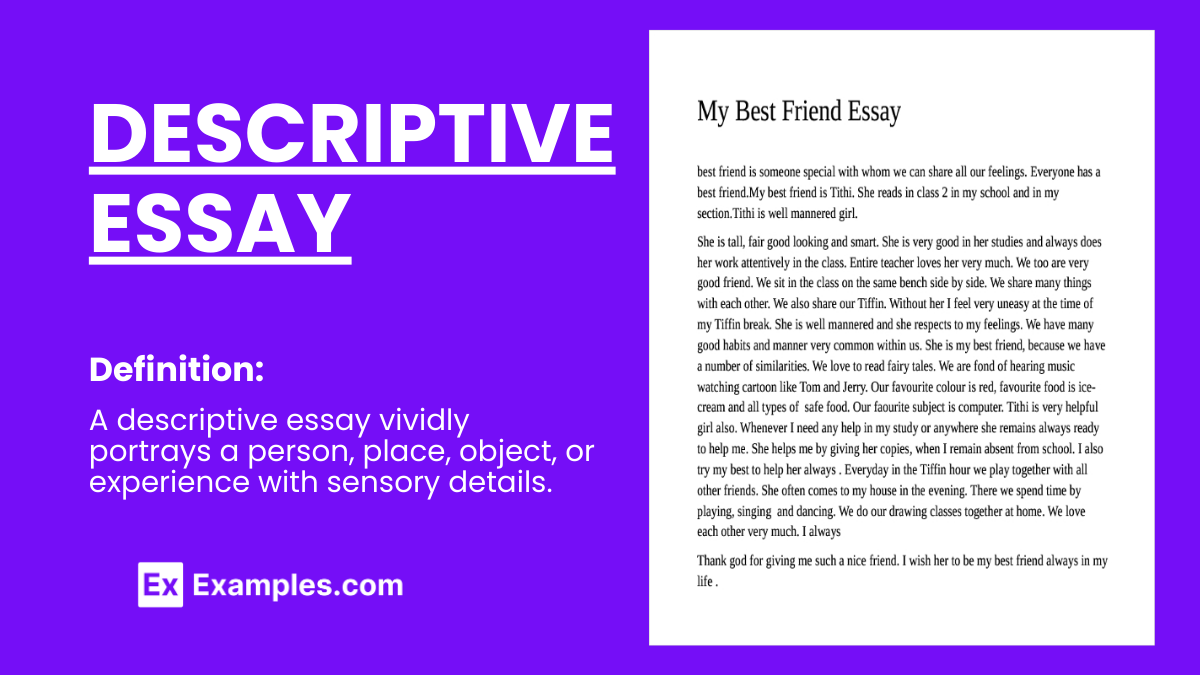
Essays are written due to various reasons and purposes. Some of the authors want to inform, some want to expose while some want to persuade. However, in descriptive essay writing , the essayist composes for the sake of displaying a picture out of his/her describing words. It may sound easy and simple but don’t be deceived, there are still more to learn. Read through this article to get hold of significant and beneficial new knowledge.
What is Descriptive Essay? A descriptive essay is a type of writing that aims to vividly describe a person, place, object, or event. In this type of essay, the writer uses sensory details such as sight, sound, smell, taste, and touch to create a clear and vivid image in the reader’s mind. The goal of a descriptive essay is to evoke a strong emotional response or create a vivid impression of the subject being described.
Descriptive Essay Format
Introduction.
Hook: Start with a sentence that captures the reader’s attention. This could be a striking fact, a question, or a vivid description. Context: Provide some background information to set the scene. Describe the setting, the situation, or the object of the essay. Thesis Statement: End the introduction with a clear thesis statement that outlines the main aspects or the overall impression of your subject.
Body Paragraphs
Each body paragraph should focus on a specific aspect or a detail that contributes to the overall picture you are trying to paint. Use the “show, don’t tell” technique by employing vivid imagery and sensory details.
Paragraph 1: Sight
Topic Sentence: Introduce the aspect of sight. Details: Describe what you see in vivid detail. Use adjectives and adverbs to bring the scene to life. Closing Sentence: Wrap up the paragraph by summarizing the importance of the visual details.
Paragraph 2: Sound
Topic Sentence: Focus on the sounds related to your topic. Details: Describe what can be heard, whether it’s the background noise, a specific sound related to the subject, or the absence of sound. Closing Sentence: Conclude by explaining how the sounds contribute to the overall impression.
Paragraph 3: Smell
Topic Sentence: Highlight the aspect of smell. Details: Describe the aromas and scents. Whether it’s pleasant or pungent, detail how it impacts the scene or the subject. Closing Sentence: Summarize how the smell adds to the depth of your description.
Paragraph 4: Touch
Topic Sentence: Discuss the sense of touch. Details: Describe the textures and temperatures. Explain how something feels to the touch and why it’s important to your description. Closing Sentence: Link the tactile details to the overall experience.
Paragraph 5: Taste (if applicable)
Topic Sentence: Introduce the sense of taste, if relevant. Details: Describe the flavors and the experience of tasting something related to your subject. Closing Sentence: Reflect on how taste enhances the description.
Summary: Briefly restate your thesis and summarize the main points of your essay. Significance: Explain the significance of the subject and the impact it has made on you or the impression it leaves. Closing Thought: End with a final thought or reflection, leaving the reader with something to ponder.
Example of Descriptive Essay
“The Sunset at the Beach” As I walked down the sandy path towards the ocean, the first thing that struck me was the vast expanse of the sea, stretching endlessly towards the horizon. The sun was beginning to set, painting the sky in shades of orange, pink, and purple. The beauty of the sunset at the beach was a breathtaking spectacle that I had come to witness. Introduction The beach has always been a place of serenity for me, especially during the sunset. The way the sun dipped below the horizon, leaving behind a tapestry of colors, always seemed magical. On this particular evening, the scene was set for a perfect display of nature’s artistry. Body Paragraphs The Vision of the Sunset As I stepped onto the soft, warm sand, my eyes were immediately drawn to the horizon. The sun, a fiery orb, was slowly descending, casting its golden glow across the sky. The clouds, mere wisps earlier in the day, now looked like cotton candy, stained with hues of pink and lavender. The reflection of the sunset on the water added a layer of brilliance to the scene, with the light dancing on the waves as they gently lapped against the shore. The Symphony of the Waves The sound of the waves provided a soothing background melody to the visual spectacle. Each wave crashed against the shore with a rhythm that was both calming and invigorating. In the distance, seagulls called to one another, their cries adding to the orchestral performance of nature. The rustling of the palm leaves in the gentle breeze played a soft, whispering harmony, creating a symphony that only the beach at sunset could offer. The Aromatic Breeze With every breath, the salty tang of the sea air filled my lungs, a distinctive aroma that immediately relaxed my body and mind. There was a freshness to it, a reminder of the vast, untamed ocean before me. Mixed with the faint scent of sunscreen and the earthiness of wet sand, the beach’s aroma was invigorating, grounding me in the moment. The Touch of Nature As I walked along the water’s edge, the cool water washed over my feet, providing relief from the day’s residual heat. The sand, now cooler than the afternoon sun, felt soft and comforting beneath my toes. Occasionally, a stronger wave would rush further up the beach, encouraging me to dig my feet into the sand, feeling the grains shift against my skin. Conclusion The sunset at the beach was not just a visual masterpiece; it was an experience that engaged all the senses. As the sun finally disappeared, leaving behind a sky painted in dark blues and purples, I felt a sense of peace and contentment. The beach at sunset had offered me a moment of beauty, tranquility, and a deep connection with nature. It was an unforgettable scene, etched in my memory, reminding me of the simple, yet profound joys of life.
Descriptive essays generally focus more on visualizing a specific topic of interest. Considering that aspect, showing you what it looks like may be helpful as well. Thus, we cautiously gathered the best samples and templates of descriptive essays for you to rely on, here are they:
Bright Topic Ideas for Your Descriptive Essay
The list of the possible topic ideas for your descriptive essay is limitless. There are a lot of choices to choose from and sometimes, it is really difficult to pick one. If you are being indecisive regarding your topic idea, here are some smart concepts to help you select one.
Descriptive Essay Ideas About People
- Description of your favorite music genre
- Treating a popular villain as a good protagonist
- The right words that would compliment your singing idol
- Why your squad is the best?
- What qualities should your future spouse possess?
- Why your aunt is the best?
Descriptive Essay Ideas About Places
- Why Manila Bay has the best sunset?
- The perfect adjective to describe your hometown
- Details on your recent vacation destination
- Why your favorite coffee shop is worth the visit?
- What makes Paris unique?
- The best description for your workplace
Descriptive Essay Ideas About Things
- Why your wedding ring is the most luxurious?
- The description of your favorite blanket
- What makes your research paper great?
- Description of your proposed food product
- Perfume: more than just the bottle
- Why your bag is great
Descriptive Essay Examples & Templates
Descriptive narrative essay example.
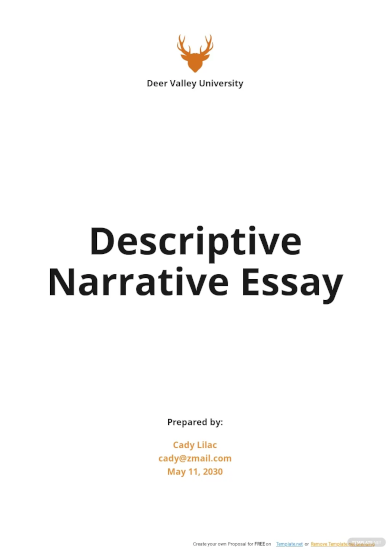
Descriptive Essay Outline Example
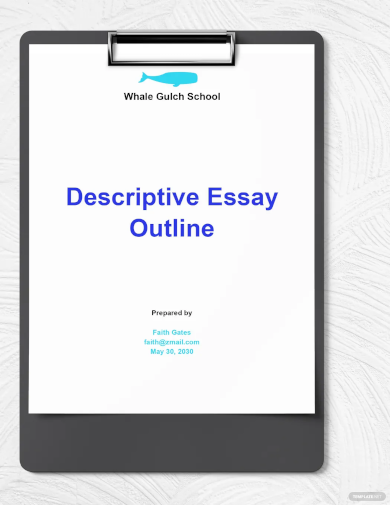
Short Essay Plan Example
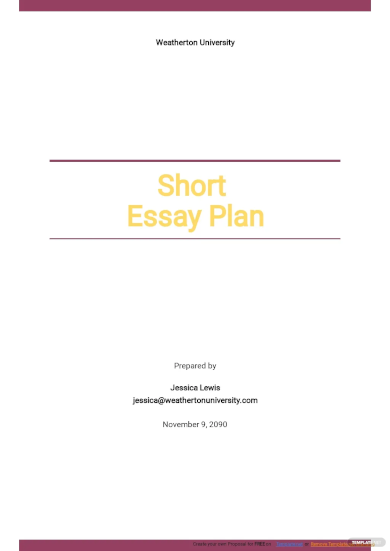
Biographical Narrative Essay Example
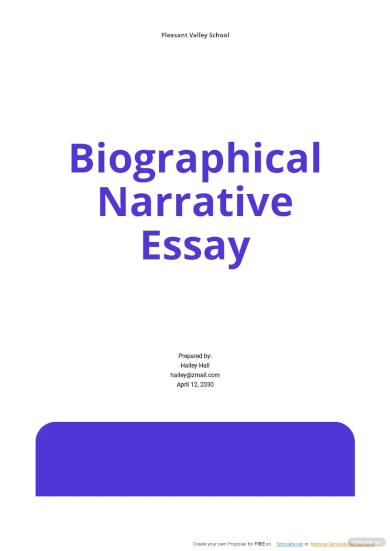
College Narrative Essay Example
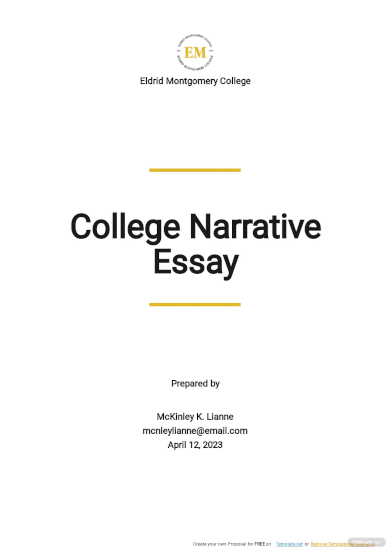
Personal Narrative Essay Example
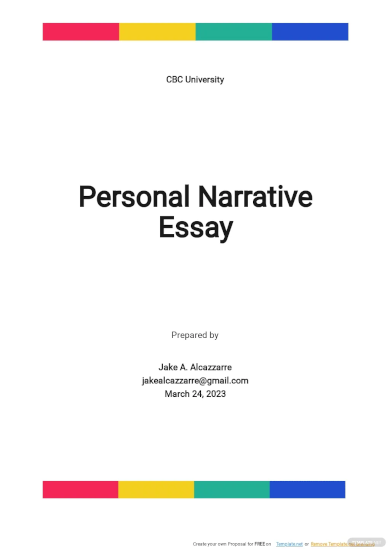
Short Narrative Essay Example
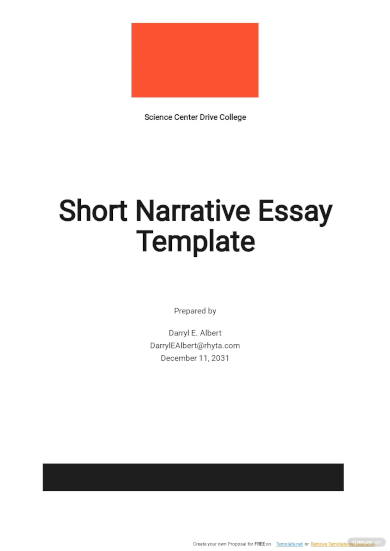
High School Descriptive Essay Example
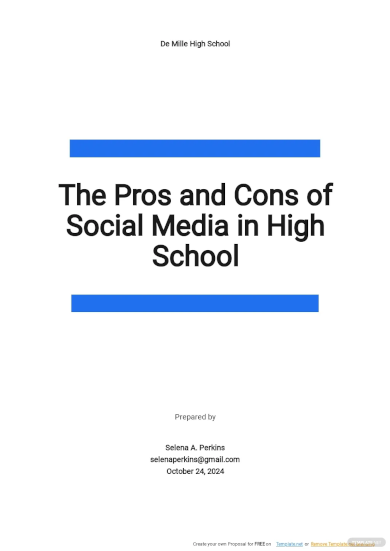
Free Simple Descriptive Essay Plan
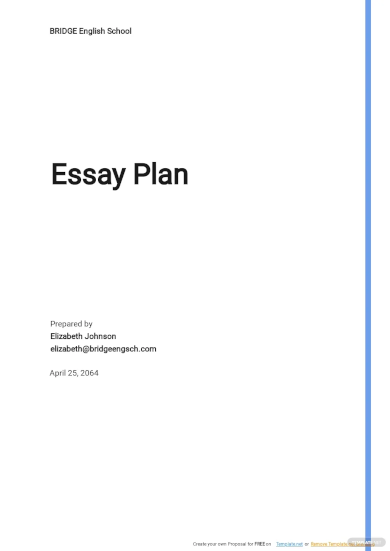
Basic Descriptive Essay Writing Example
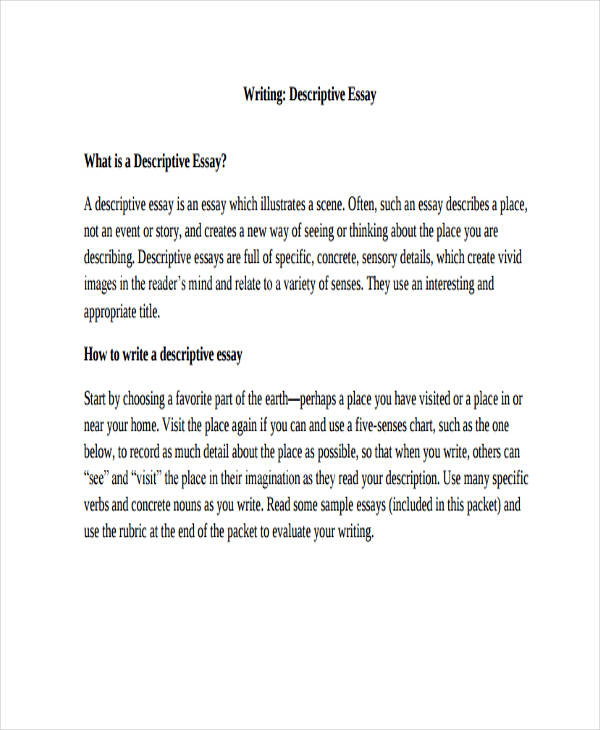
latterdaylearning.org
Short Descriptive Essay Example
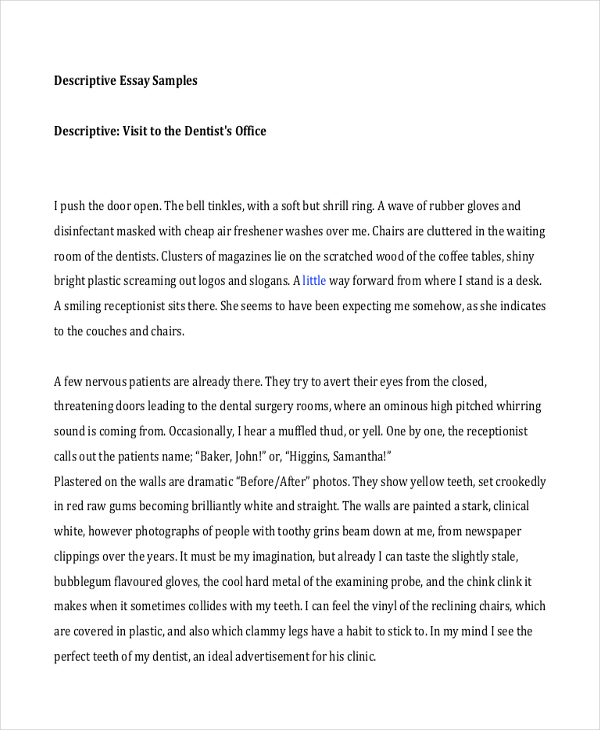
trudyamiller.wikispaces.com
Descriptive Essay Structuring Example
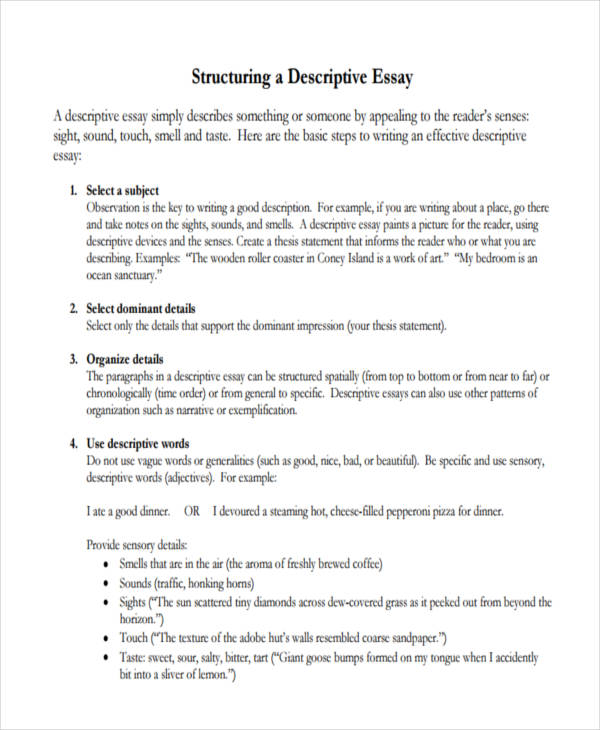
colegiobennett.org
Simple Descriptive Essay Example
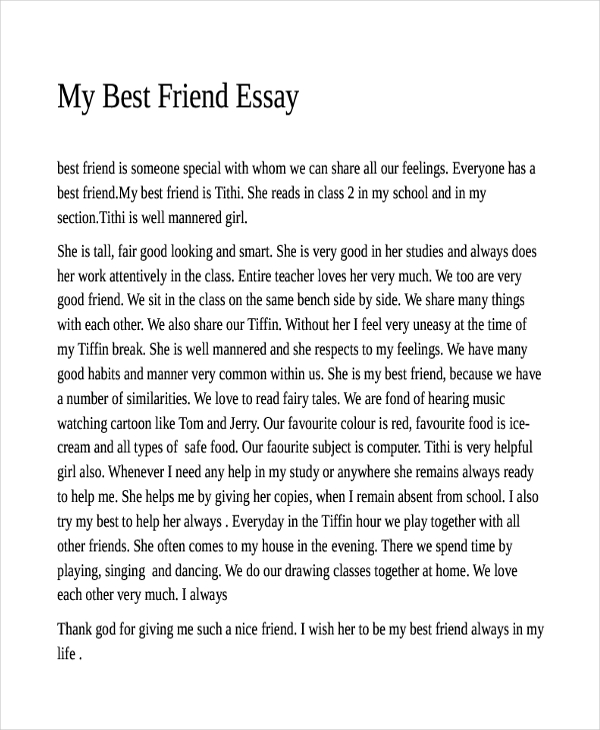
essssay.com
Narrative Descriptive Essay Example

preservearticles.com
Descriptive Essay Prewriting Example
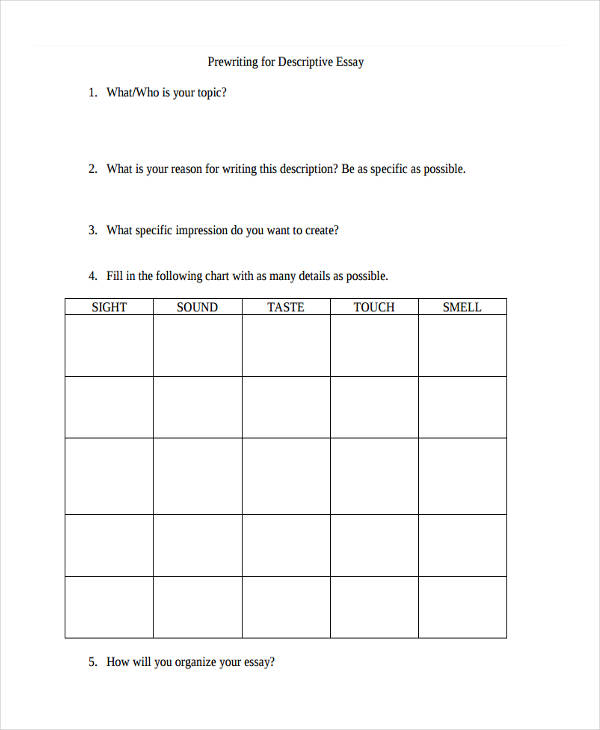
fileserver.net-texts.com
Personal Descriptive Essay Example
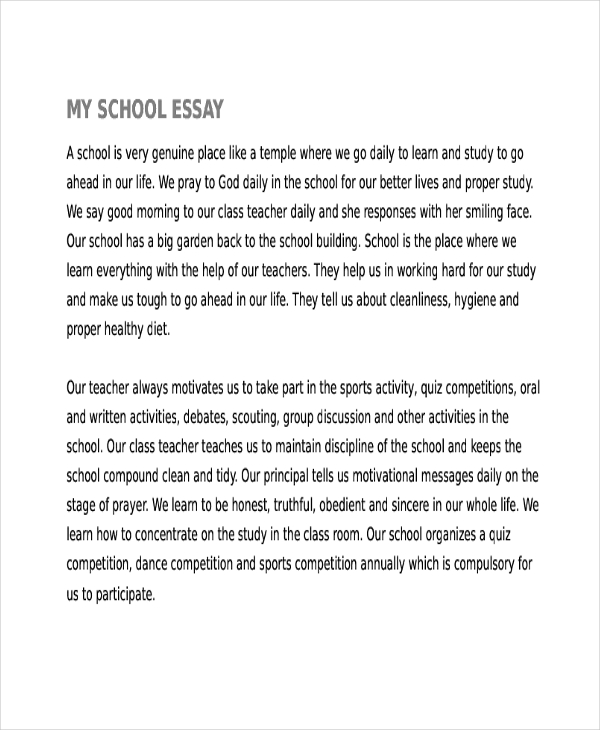
indiacelebrating.com
Descriptive Essay Characteristics Example
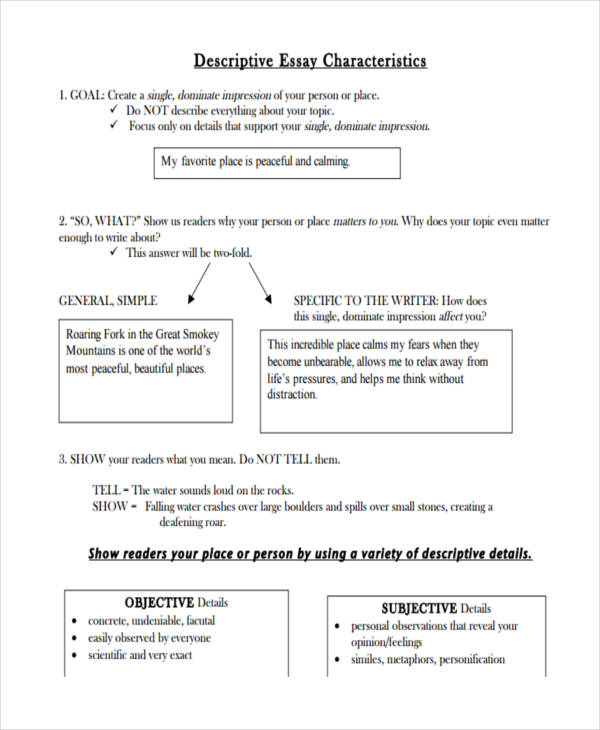
Descriptive Essay Description Guide Example
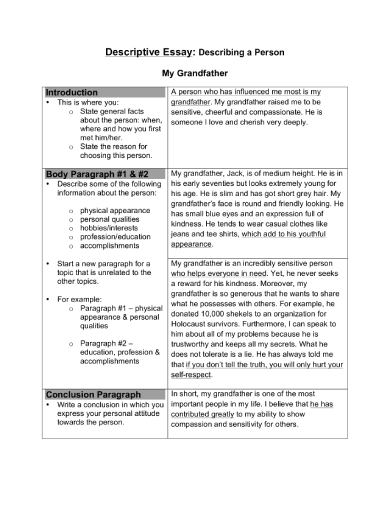
ortbinyaminaenglish.yolasite.com
Descriptive Essays about Places Example
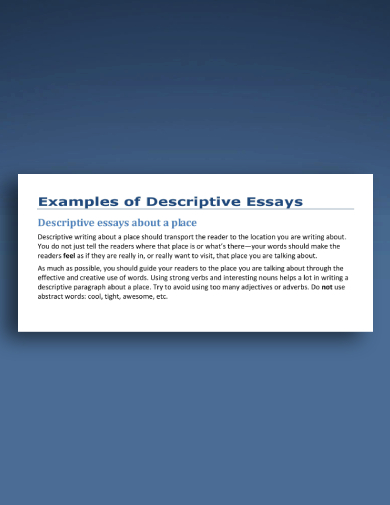
Excellent Descriptive Essay Example
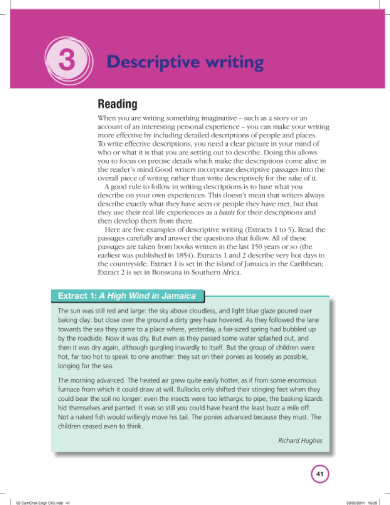
hoddereducation.co.uk
Descriptive Essay Writing Exercise Example
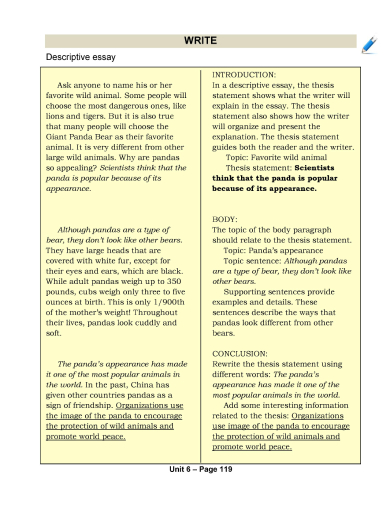
Educational Descriptive Essay Example
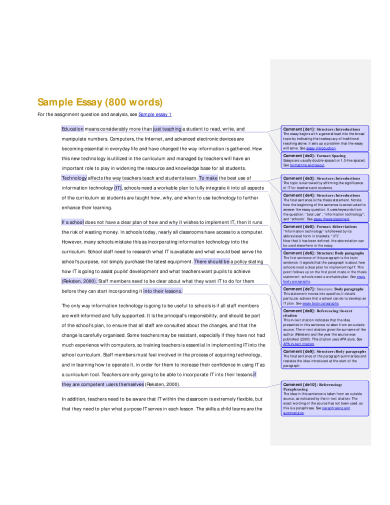
owll.massey.ac.nz
Spring Break Descriptive Essay Example
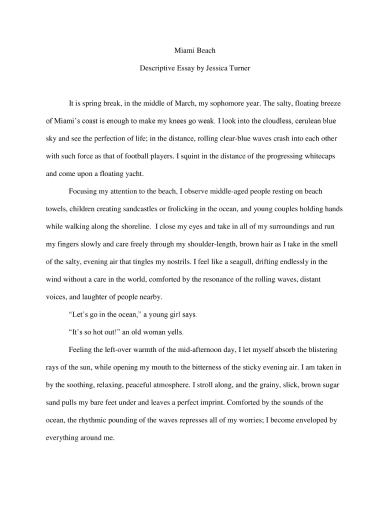
cheylin.com
Descriptive Essay Sentence Writing Example
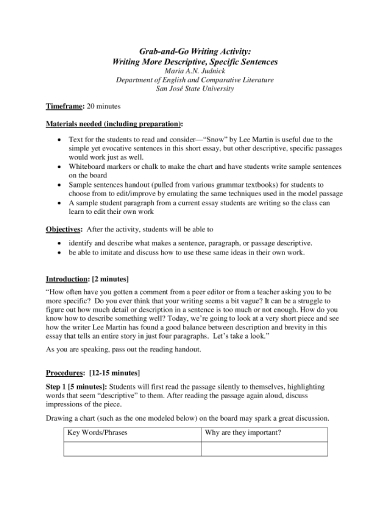
Descriptive Essay Paragraph Guidelines Example
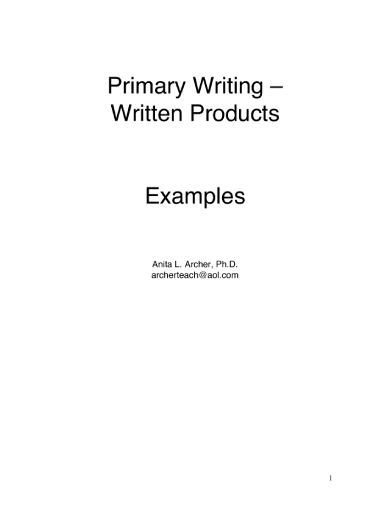
Stylish Descriptive Essay Rubric Example
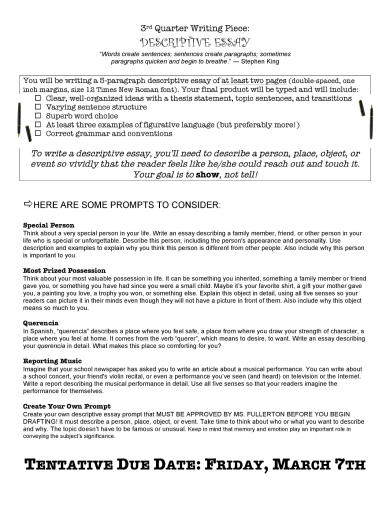
Descriptive Essay Writing Techniques Example
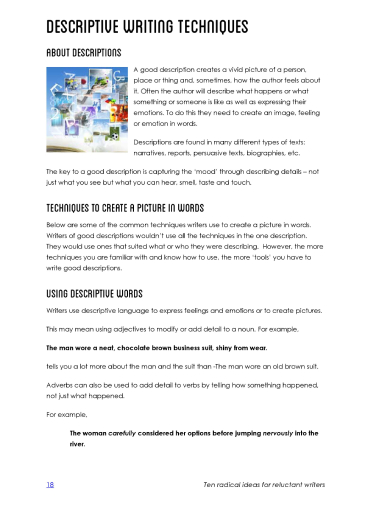
multifangled.com.au
Free Descriptive Essay Example
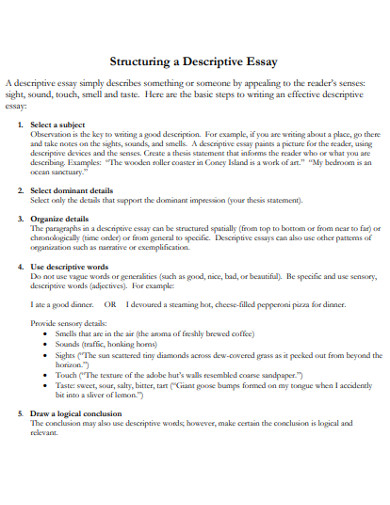
asc.weebly.com
Basic Descriptive Essay Example
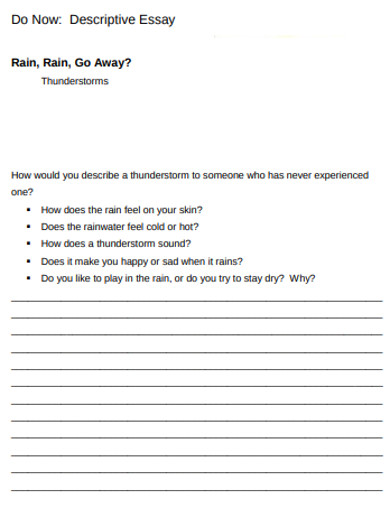
hortonskids.org
Sample Descriptive Essay Example
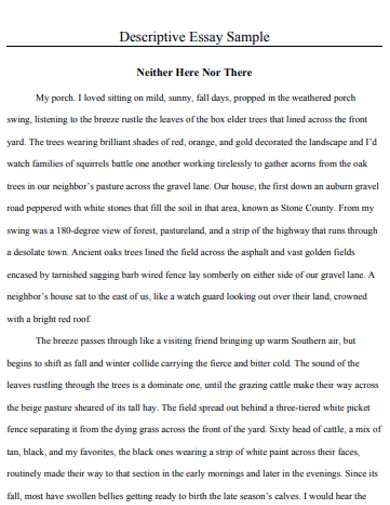
essaytigers.com
Descriptive Essay in PDF Example
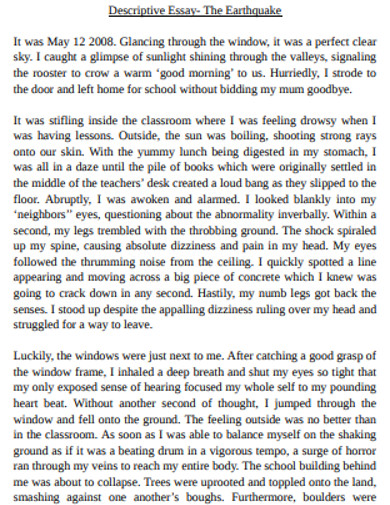
Printable Descriptive Essay Example
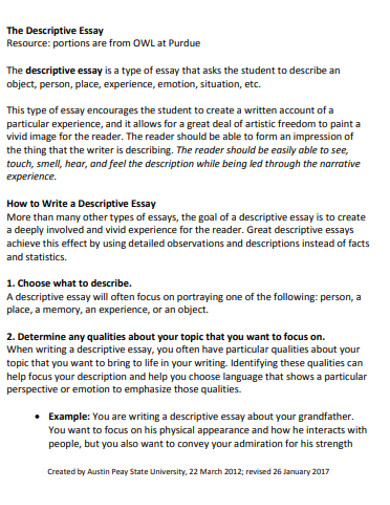
Direction Descriptive Essay Example
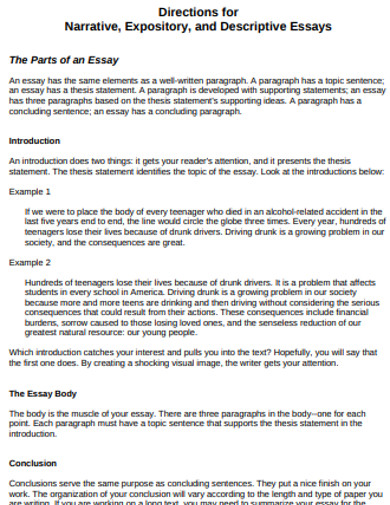
wba.aplusanywhere.com
Descriptive Essay Scoring Guide
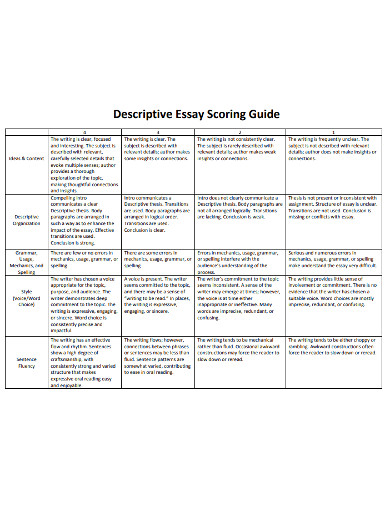
washoeschools.net
Professional Descriptive Essay
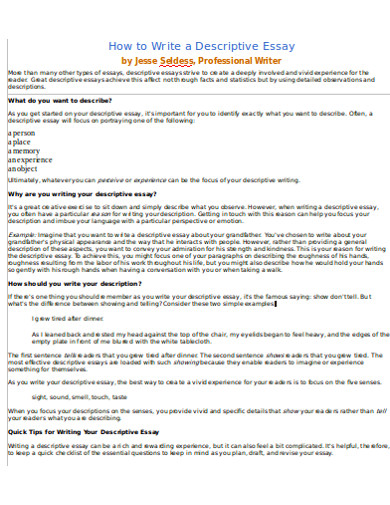
Descriptive Essay Format Example
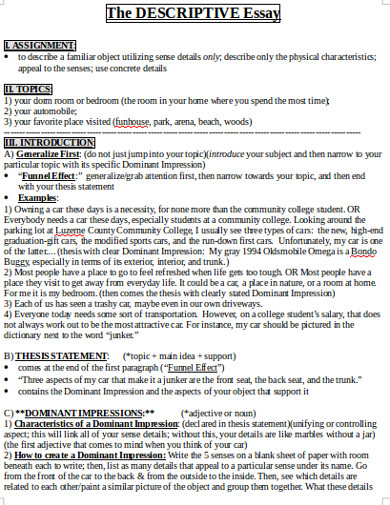
staff.kings.edu
Assignment Descriptive Essay Example
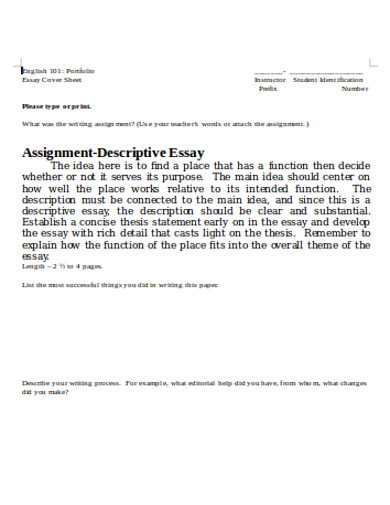
fd.valenciacollege.edu
What are the 4 types of essays?
An essay is an extended piece or composition that shows and supports a thesis or proposition. Essays help the expression of an author’s ideas in various ways. Before composing your own essay, it is important to identify its purpose first, and in doing that, distinguishing its type would be a great beginning. Correspondingly, here are the four different types of essays:
Narrative Essays: to tell
Taking it into its most basic sense, narrative essays are used if the author wants to tell a story about a real-life adventure. This type of essay is expressed in a particular point-of-view. Commonly, it is the author’s viewpoint that is being followed. Moreover, in writing your own short narrative essay , apply realistic emotions and appropriate sensory details to provide your readers with the full taste of your story. By doing this, you are not simply telling them but also engaging them in the story’s sequence and elements. It is also advisable to state verbs as vivid and as precise as possible. The thesis statement of a narrative essay is commonly found in the opening sentence or the last sentence of the introductory paragraph.
Descriptive Essays: to describe
You may confuse yourself between narrative and descriptive essays ; however, differentiating both is really easy. Rather than telling a story, a descriptive essay illustrates a specific topic such as a person, place, experience, emotion, event, etc. by means of words. You don’t simply state your experience in this type of essay; on top of that, you let your reader experience the same thing through your descriptions. In writing your own short descriptive essay , it is important to remember that you are not writing to tell but to show. Using sensory and vivid words is also recommended.
Expository Essays: to uncover and clarify
From its name itself, an expository essay is used to expose something on matters that are known to others. This type of essay is a genre of composition that aims to explain, illustrate, clarify or explicate a certain subject for the readers. Thus, an expository essay could include investigation and evaluation of ideas. This could be derived through comparison and contrast, definition, giving examples, assessment of cause and effect, etc. Moreover, in composing an expository essay, the author set his/her emotions aside for this type of essay is based on mere facts. The first point-of-view is not applied in this essay as well.
Persuasive Essays: to convince
If the expository essays talk about the facts then persuasive essays talk about arguments. The main purpose of a persuasive essay is to win over the trust of the reader to accept your viewpoint, opinion or proposition as the author. In writing a persuasive essay, your opinions should be supported by relevant facts and logical and sound reasoning. Though the essayist should lay all necessary details from both sides of the argument, he/she must comprehensibly explain why one side is correct or more favorable than the other.
Despite essays being categorized into four types, it is also important to know that an essay is not limited to one type only. In some cases, a narrative essay could also be mixed with a short descriptive essay or a short persuasive essay combined with an expository type. Nevertheless, identifying the purpose of your essay is vital before writing. However, if doing it challenges you, knowing these types is a great substitute.
What Is the Purpose of a Descriptive Essay?
Some people like to watch movies rather than to read books. This is because an actual image is easier to absorb than that on writing. This is why it’s important for a writer to pay close attention to detail. A descriptive essay conclusion should provide the reader with a mental picture of a given matter.
This is especially essential when writing pieces meant for a younger audience, as they have a more imaginative mind than the average adult. A writer must be creative when using imaginative language in order for the reader to properly comprehend what is being portrayed. To do so, the writer should also be knowledgeable about the topic. After all, you don’t want to give your readers the wrong interpretation .
How to Write a Descriptive Essay
A good descriptive essay comes from a knowledgeable and imaginative mind. Thus, in descriptive writing , it’s important for one to be specific on details. After seeing a few samples that we have shown earlier, here is a step-by-step guideline to help you in composing a descriptive essay worth reading.
1. Choose a topic.
If there is no given topic, it would be great to select one that you are knowledgeable and familiar with. Considering that your whole descriptive essay would revolve on this specific subject, choosing a topic that you recognize would keep everything simpler for you. By doing such, you can freely decide what words are the most appropriate to use; as a result, it will be easier for you to describe your topic. Furthermore, your reader could be meticulous and educated on your subject, so being knowledgeable about your own topic is wise prevention against bad impression.
2. Construct your thesis statement.
Alright, now that you have your own topic already, it is important to know what specific message you want your reader should focus on reading your whole essay. Thus, it is important to always provide a thesis statement , the umbrella sentence of all your ideas. Write this in one concise sentence in your introduction and conclusion. Often, a thesis statement is mentioned in the last sentence of your introductory paragraph.
3. Gather the necessary information and ideas.
Though you are already proficient in your topic, it is still recommendable to research about your specific subject. With this, you are not just gaining new information but also checking the correctness of your knowledge. It would also be great to expand your vocabulary, especially in adjectives and adverbs, since writing one of these involve loads of describing. Moreover, also focus on the sensory words that correspond to sight, smell, taste, sound, and touch of the given subject.
4. Create an outline.
Obtaining all of the significant details, crafting an essay outline for your work will allow you to arrange your contents in a rational and chronological order. Also, being educated with different formats in writing an essay would really make a great difference in your composition.
5. Proofread.
After writing your own descriptive essay, it might feel perfect already, but most of the time, it is not. Hence, read your entire work and review if there are any errors pertaining to your grammar and spelling. Furthermore, asking for help from a well-versed friend of yours to conduct a peer-review to your work would be extremely useful.
6. Finalize your composition.
The next thing to do after the editing is to finalize your descriptive essay to its finest version. Make sure that your essay follows a specific format, consisting of the proper parts of the essay .
Smart Tips for Writing a Descriptive Essay
The fundamentals of the descriptive writing procedures are now given to you; nevertheless, it would always be great to aim for something better. Now, here are some intelligent tips that would make your essay certainly more compelling.
Establish a connection with your writing.
The key to writing a good effective essay is to have the passion to write it; thus, in choosing your topic it would be great to have a familiar one or a subject that truly makes you curious. Let your interest be the seed of your fruitful composition.
Spend time to think.
In writing your own descriptive essay, let your brain do its job. Do not rush, give yourself an adequate amount of time to ponder on the necessary details that you should include and what approach you should apply. Provide yourself a clear plan of your descriptive essay writing. Moreover, look at your topic from different angles. This will allow you to take a closer look at every detail of your subject.
Apply the word vomit technique.
The word vomit technique or also called as “ free writing ” is the spontaneous use of words without considering any rules. This is a good technique in making a draft of your starting an essay . It allows your ideas to keep flowing without exerting much effort. Once this is done, you can pick out points that would go well with your essay.
Take a break before finalizing it.
Because right after writing your composition, your thought highly recognizes your word construction; thus, it does not really notice the errors and automatically treats them as correct pieces of your work. Allowing your mind to clear out for a while will make it easier for you to critic your own work. Furthermore, utilizing grammar-checking software is also a splendid move.
Descriptive Essay Generator
Text prompt
- Instructive
- Professional
Write a descriptive essay about a place you love to visit and what makes it special.
Describe in a descriptive essay your dream job and what it would be like to work there.
+1 (603) 932 7897

- 5 Common Types of High School Essays (With Examples)
- Last modified 2024-04-01
- Published on 2021-08-28

When it comes to high school essays, descriptive and narrative essays are very similar in the sense that they encourage writers to be creative in expressing their ideas. Expository and argumentative essays focus on providing clear information and making compelling points. Analytical essays require writers to present their arguments and are intended to enhance readers’ understanding of a topic, while persuasive writers try to persuade readers to accept a point of view.
In this article, we will go into detail about each one to help you better define the type and the writing method when you start writing.
1. Descriptive high school essays
A descriptive essay asks writers to describe something vividly —object, person, place, experience, emotion, situation, etc., but more commonly, you will be asked to describe something abstract —emotions, experiences, or something outside of your typical experience.
A descriptive essay allows writers to be creative and have the freedom to express, especially when the topic is personal about them and what they care about, such as their favorite food or culture. Even though this sounds easy, this type of essay tests the writer’s ability to make appropriate word choices and have strong creativity to help readers visualize the overall picture of what they are writing about. A descriptive essay normally starts with introducing the subject or object of description, continuing with giving an overall picture, and then going into details. Additionally, understanding different points of view, as detailed in the Guide to Point of View in Writing , can greatly enhance the descriptive elements of the essay, providing varied perspectives and enriching the reader’s experience
Below is an example of a descriptive essay from Yourdictionary :
I watched a thunderstorm, far out over the sea. It began quietly, and with nothing visible except tall dark clouds and a rolling tide. There was just a soft murmur of thunder as I watched the horizon from my balcony. Over the next few minutes, the clouds closed and reflected lightning set the rippling ocean aglow. The thunderheads had covered up the sun, shadowing the vista. It was peaceful for a long time.
I was looking up when the first clear thunderbolt struck. It blazed against the sky and sea; I could see its shape in perfect reverse colors when I blinked. More followed. The thunder rumbled and stuttered as if it could hardly keep up. There were openings in the cloud now, as if the sky were torn, and spots of brilliant blue shone above the shadowed sea.
I looked down then, watching the waves. Every bolt was answered by a moment of spreading light on the surface. The waves were getting rough, rising high and crashing hard enough that I could hear them.
Then came the rain. It came all at once and in sheets, soaking the sand, filling the sea. It was so dense I could only see the lightning as flashes of light. It came down so hard the thunder was drowned. Everything was rhythmic light and shadow, noise and silence, blending into a single experience of all five senses.
In an instant it stopped. The storm broke. The clouds came apart like curtains. The rain still fell, but softly now. It was as if there had never been a storm at all, except for a single signature. A rainbow, almost violently bright, spread above and across the water. I could see the horizon again.
2. Narrative Essay
A narrative high school essay is similar to a descriptive essay but focuses more on the story description rather than the object description. The story can be about a personal experience that the writer has had, an event, a story, or an incident. Writers can even narrate a fictional experience that they haven’t had. Narrative essays are typically written in the first person. For example, the personal statement high school students must write for college applications.
The purpose of a narrative essay is not only to tell a story, but also to highlight the importance of the experience. Therefore, to write a perfect narrative essay, writers must include the elements of settings, context, plot, ending, and climax.
We have an example from a student’s work, which was published on the blog: People’s Republic of Creativity
Glup, glup.
I sat watching the plunger slowly make its way down the tube and into Miriam’s body. Inside the tube was a clear unknown liquid that would soon be injected into my own body. This was the third time this week, the twelfth time this month, and who knows how many times since we have been trapped in this hell on earth. Each day, we have only been given the bare minimum of food, water, and sleep. I don’t know how much longer we can survive before deemed useless by him.
Miriam fell out of her chair and onto the cold concrete floor, screaming in pain. She scrambles for something she can grasp onto to prop her malnourished body up. Then the piercing sound just suddenly stopped. Her thin arms that look only of bones and skin drop to the ground and she lay still on the floor, as if she were…dead. Please don’t tell me she’s dead! No, she couldn’t be; we promised each other to live until the day of liberation.
She needs to live.
It was my turn. He walked over with a syringe full of what had just been injected into Miriam. I try to focus on the red, black, and white badge on his left arm instead of letting the fear crawl in and take over my brain. But the unsettling tension stirs my thoughts around and around.
“Twin A1387, let’s hope what happened to your sister doesn’t happen to you.” He smirked. The needle pierced through my skin and my body was suddenly aflame. The raging blaze spread through every one of my veins, until I was shrouded in darkness.
When I opened my eyes again, I found myself in an empty confinement. The space next to me, the space for Miriam, was empty too. Where was everyone? Most importantly, where was Miriam?
I got up and set my bare foot onto the dirty, wooden floor. Suddenly, my head started spinning and along with it, the world spun too. I fell to the ground, and when I could finally lift my head, what I saw above me terrified me. It was him, death in human form, and beside him were four of his helpers. They grabbed my arms and forced me to stand up.
“Good morning A1387. I am afraid your dear twin sister couldn’t handle the injections from yesterday. Let’s hope your fragile little limbs can endure those chemicals. I wonder how many more injections it will take for you to meet your pathetic sister,” he said, patting my head. His tone was playful, but deadly.
I froze. What? Miriam…dead? That one word, “twins”, has taken away everything of what feels like my past life, and now my last hope? I felt a surge of anger, hatred, sadness, fear, devastation swirling inside me like boiling lava in a volcano, ready to erupt. I wanted to scream, to shout, to kill him, but I couldn’t. My soft limbs felt as if they would collapse merely by trying to stand up. They would be harmless and defenceless against the Angel of Death. When he saw the hatred on my face, he started laughing hysterically and simply said, “What a shame; she was only 13. I cannot wait to see how long it will take for you to fall apart!”
3. Expository Essay
According to Purdue University , the expository essay is a genre of essay that requires the student to investigate an idea, evaluate evidence, expound on the idea, and set forth an argument concerning that idea in a clear and concise manner. To accomplish this, writers use the method of comparison and contrast, definition, example, cause and effect, etc.
Writers are not required to argue or make a personal opinion but to present balanced and well-organized facts and figures.
In an expository essay–as the name suggests–you need to expose the particular subject in question by providing enough information. It is an informative piece of writing that provides a balanced analysis of the topic. It does not contain any personal opinion; instead, it is based on real facts and figures. Therefore, this kind of high school essay is commonly assigned in high school or college in order to test students’ familiarity with a topic and ability to convey information.
This is an example from College Board’s SAT Writing Prompt.
In response to our world’s growing reliance on artificial light, writer Paul Bogard argues that natural darkness should be preserved in his article “Let There be dark”. He effectively builds his argument by using a personal anecdote, allusions to art and history, and rhetorical questions.
Bogard starts his article off by recounting a personal story – a summer spent on a Minnesota lake where there was “woods so dark that [his] hands disappeared before [his] eyes.” In telling this brief anecdote, Bogard challenges the audience to remember a time where they could fully amass themselves in natural darkness void of artificial light. By drawing in his readers with a personal encounter about night darkness, the author means to establish the potential for beauty, glamour, and awe-inspiring mystery that genuine darkness can possess. He builds his argument for the preservation of natural darkness by reminiscing for his readers a first-hand encounter that proves the “irreplaceable value of darkness.” This anecdote provides a baseline of sorts for readers to find credence with the author’s claims.
Bogard’s argument is also furthered by his use of allusion to art – Van Gogh’s “Starry Night” – and modern history – Paris’ reputation as “The City of Light”. By first referencing “Starry Night”, a painting generally considered to be undoubtedly beautiful, Bogard establishes that the natural magnificence of stars in a dark sky is definite. A world absent of excess artificial light could potentially hold the key to a grand, glorious night sky like Van Gogh’s according to the writer. This urges the readers to weigh the disadvantages of our world consumed by unnatural, vapid lighting. Furthermore, Bogard’s alludes to Paris as “the famed ‘city of light’”. He then goes on to state how Paris has taken steps to exercise more sustainable lighting practices. By doing this, Bogard creates a dichotomy between Paris’ traditionally alluded-to name and the reality of what Paris is becoming – no longer “the city of light”, but moreso “the city of light…before 2 AM”. This furthers his line of argumentation because it shows how steps can be and are being taken to preserve natural darkness. It shows that even a city that is literally famous for being constantly lit can practically address light pollution in a manner that preserves the beauty of both the city itself and the universe as a whole.
Finally, Bogard makes subtle yet efficient use of rhetorical questioning to persuade his audience that natural darkness preservation is essential. He asks the readers to consider “what the vision of the night sky might inspire in each of us, in our children or grandchildren?” in a way that brutally plays to each of our emotions. By asking this question, Bogard draws out heartfelt ponderance from his readers about the affecting power of an untainted night sky. This rhetorical question tugs at the readers’ heartstrings; while the reader may have seen an unobscured night skyline before, the possibility that their child or grandchild will never get the chance sways them to see as Bogard sees. This strategy is definitively an appeal to pathos, forcing the audience to directly face an emotionally-charged inquiry that will surely spur some kind of response. By doing this, Bogard develops his argument, adding gutthral power to the idea that the issue of maintaining natural darkness is relevant and multifaceted.
Writing as a reaction to his disappointment that artificial light has largely permeated the presence of natural darkness, Paul Bogard argues that we must preserve true, unaffected darkness. He builds this claim by making use of a personal anecdote, allusions, and rhetorical questioning.
4. Argumentative Essay
The argumentative high school essay is similar to the expository essay, because it requires writers to present their evidence-based arguments. Writers have to present a thesis statement, gather and evaluate evidence, and establish a position on the topic. Many people think argumentative and expository essays are the same. They belong to a similar genre, but an argumentative essay requires more research than an expository essay. An expository essay is normally used in the SAT test, because test takers are required to investigate and present points from the prompts given. An argumentative essay is generally used in a final project or a capstone, which requires length and detailed research. The essay is divided into 3 parts: introduction, body, and conclusion. The introduction has a topic and thesis statement, the body has evidence and arguments, and the conclusion summarizes the arguments and potential directions for future research.
Below is an example from a GRE writing answer from ETS :
Prompt : The best ideas arise from a passionate interest in commonplace things
Discuss the extent to which you agree or disagree with the statement above and explain your reasoning for the position you take. In developing and supporting your position, you should consider ways in which the statement might or might not hold true and explain how those considerations shape your position.
Passion is clearly necessary for a truly great idea to take hold among a people—passion either
on the part of the original thinker, the audience, or ideally both. The claim that the most lucrative
subject matter for inspiring great ideas is “commonplace things” may seem initially to be counterintuitive. After all, aren’t great ideas usually marked by their extraordinary character? While this is true, their extraordinary character is as often as not directly derived from their insight into things that had theretofore gone unquestioned. While great ideas certainly can arise through seemingly pure innovation… say, for example, Big Bang cosmology, which developed nearly all of its own scientific and philosophical precepts through its own process of formation, it is nevertheless equally true that such groundbreaking thought was, and is, still largely
a reevaluation of previous assumptions to a radical degree… after all, the question of the ultimate nature of the universe, and man’s place in it, has been central to human thought since the dawn of time. Commonplace things are, additionally, necessary as material for the generation of “the best ideas” since certainly the success among an audience must be considered in evaluating the significance and quality of an idea.
The advent of Big Bang cosmology, which occurred in rudimentary form almost immediately upon Edwin Hubble’s first observations at the Hooker telescope in California during the early 20th century, was the most significant advance in mankind’s understanding of the universe in over 400 years. The seemingly simple fact that everything in the universe, on a very large scale, is moving away from everything else in fact betrays nearly all of our scientific knowledge of the origins and mechanics of the universe. This slight, one might even say commonplace, distortion of tint on a handful of photographic plates carried with it the greatest challenge to Man’s general, often religiously reinforced, conception of the nature of the world to an extent not seen since the days of Galileo. Not even Charles Darwin’s theory, though it created more of a stir than Big Bang cosmology, had such shattering implications for our conceptions of the nature of our reality. Yet it is not significant because it introduced the question of the nature of what lies beyond Man’s grasp. A tremendous number of megalithic ruins, including the Pyramids both of Mexico and Egypt, Stonehenge, and others, indicate that this question has been foremost on humankind’s collective mind since time immemorial. Big Bang cosmology is so incredibly significant in this line of reasoning exactly because of the degree to which it changed the direction of this generally held, constantly pondered, and very ancient train of thought.
Additionally, there is a diachronic significance to the advent of Big Bang cosmology, which is that, disregarding limitations such as the quality of optical devices available and the state of theoretical math, it could have happened at any point in time. That is to say, all evidence points to roughly the same raw intellectual capacity for homo sapiens throughout our history, our progress has merely depended upon the degree of it that a person happens to inherit, a pace that has been increasing rapidly since the industrial revolution. Yet this discovery had to happen at a certain point in time or another—it cannot have been happening constantly or have never happened yet still be present—and this point in time does have its own significance. That significance is precisely the fact that the aforementioned advent must have occurred at precisely the point in time at which it truly could have occurred—that is to say, it marks the point in our history when we had progressed sufficiently to begin examining, with remarkable substantiated acuity, the workings of the universe across distances that would take millions of human lifetimes to reach or to traverse. The point for the success of this advent must necessarily have been, additionally, the point at which the audience concerned was capable and prepared to accept such a radical line of reasoning.
Both factors, a radical, passionate interpretation of the commonplace and the preparedness to accept such an interpretation, are necessary for the formulation of a truly great idea. If the passion is absent from an inquiry by the thinker or by the bulk of an audience, the idea will die out if it comes to fruition at all. If the material is not sufficiently commonplace to be considered by an informed audience of sufficient size, the same two hazards exist. Given these two factors, the idea must still be found palatable and interesting by the audience if it is to hope to gain a foothold and eventually establish itself in a significant fashion.
5. Analytical Essay
An analytical essay is a writing genre that provides an in-depth analysis of a topic, ranging from art, music, and literary text to politics, science, and philosophy, etc. Analytical essays can boost a writer’s writing skills and overall comprehension of a topic while helping readers become more educated about the subjects of importance. This type of essay does not aim to persuade readers to a certain point of view but rather to provide a well-rounded and comprehensive analysis for the readers. The analytical essay is normally used in the GRE writing section.
A good analytical essay includes a thesis statement stating your main argument, followed by an analysis of your thesis and supporting evidence. Here are the 7 Steps to Write a Literary Analysis Essay .
We will take an example from a student’s work about CRISPR, a genetic engineering method. The full essay can be accessed here , but below is the preview of the essay:
No matter how much money people are willing to pay for health care, they may still suffer terribly from incurable diseases such as AIDS and cancer because of the underdevelopment of medical technology. However, today, the advancement in human knowledge has led to the introduction of human gene-editing, turning impossibility to possibility. In particular, the recent technology for genome editing called CRISPR has been having a groundbreaking impact on research in genetic science. This is due to its remarkable potential to simply cure genetic diseases in an embryo before they have a serious effect on further developmental progression. Although currently, there have been numerous debates regarding its extension in research for widespread uses, CRISPR is a completely promising technology because of the benefits it brings to people.
CRISPR, or Clustered regularly interspaced short palindromic repeats, is the newest innovation in genetic engineering. The way CRISPR works is similar to “the scissor-like action of Cas 9 to target… any specific DNA sequence” (Baylis and Rossant). By making cuts in specific locations in DNA, CRISPR can cure diseases and make alterations in an embryo’s DNA, which prevent diseases from being passed down to following generations (Baylis and Rossant). Throughout the history, governments and researchers came up with different approaches politically and scientifically in attempt to control population. They hoped to encourage the “richest, wisest and healthiest to breed like rabbits” and the “sick, stupid, and poor to take one for the empire and remain childless” (Comfort 28). The second attempt happened during the 20th century, when the U.S government passed the law preventing marriage and immigration that would threaten a perceived core American “stock.” Another more extreme example was when Nazi sterilization law further advanced this population control approach. Later in the century, a biotechnological approach was established as a safer and more humane way to manage population health (qtd in Comfort 28). “Gene surgery,” which is similar to CRISPR technology, was established and followed by contentious debates regarding ethical issues between disease treatment and human trait enhancements. Currently, there has been a halt in the use of CRISPR because of the increase in concern from the public about the pros and cons of this technology.
Further reading:
- Where to Submit Your Writing Works: 5 Main Platforms
- 6 Differences between High School and College Writing
- 20 Tips to Improve Your Writing
- Guide to Point of View in Writing
- 10 Mistakes High School Students Make in Creative Writing
- How to Overcome Writer’s Block in High School Writing Competitions
Aralia Writing Courses

This class is offered in the summer every year. Students from 13 to 18 years old wanting to learn how to shape their written English into effective and publishable creative pieces will find this particular Writing Competition course very exciting. The class will be shown a range of tools to learn the nuances of controlled, purposeful writing, including: figurative language, effective structuring and specific forms that they will apply to their own pieces.

This course helps students develop and improve their writing skills to prepare students for higher education courses. The methodology emphasizes the ability to read critically, think critically, and write critically. Students will learn informative, narrative, descriptive, creative, and persuasive essay writing skills. Students will learn how to brainstorm, structure and outline, form an argument, defend it, incorporate academic sources, and develop a clear, articulate writing style. The focus will be on the writing process, intended audience, consistent tenses, point of view, correct grammar uses, building vocabulary, appropriate style, and proper research and citation protocols.
- Academic Tips

Interested in learning more?
Aralia Education is an innovative online education platform for ambitious middle and high school students worldwide. Aralia’s instructors propel students forward by helping them build a strong foundation in traditional academic courses. They also actively engage and guide students in exploring personal interests beyond their school curriculum. With this holistic approach, Aralia ensures its students are well-prepared for college and equipped for success in their future careers.
- College Accelerator Program
- Comprehensive Introduction to High School
- Academic Empowerment Program
- Test Preparation Bootcamp
- Private Lessons
- Student Awards
- Competitions
Give us a call: +1 (603) 932 7897
Email us: [email protected]
Add us on WhatsApp:

Descriptive Essay
Descriptive Essay About A Place
Writing a Descriptive Essay About A Place - Guide With Examples
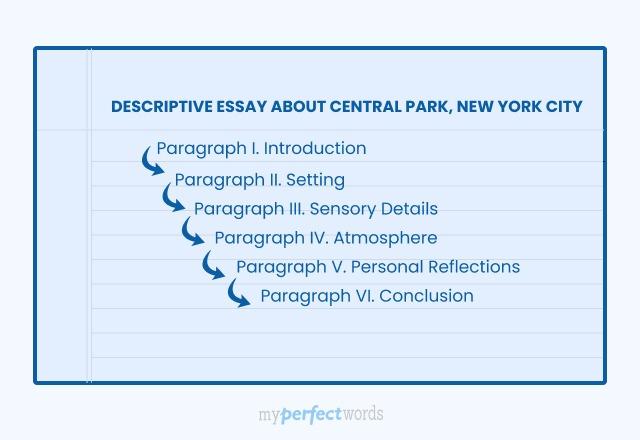
People also read
Descriptive Essay - A Complete Guide
Descriptive Essay Examples & Writing Tips
Top 250+ Descriptive Essay Topics & Ideas
Creating a Descriptive Essay Outline - Format & Example
Crafting an Authentic Portrait: A Guide to Writing a Descriptive Essay About a Person
Writing a Descriptive Essay About Myself - Tips and Tricks
How to Craft the Perfect Descriptive Essay About A Person You Admire
Descriptive Essay About My Mother - A Guide to Writing
Delicious Descriptions: A Guide to Writing a Descriptive Essay About Food
Write A Descriptive Essay About Nature With This Guide
Learn Tips to Write a Descriptive Essay About Autumn - Step into the Golden Season
Are you writing an essay about a place and need to know where to start?
The beauty of the world lies in its diversity, and every place has something unique to offer. A descriptive essay can bring these places alive for readers. But the question is, how do you write one?
Don't worry! We've got the right answer for you!
With a few examples and some tips on crafting your own essay, you can write it easily.
So read on to find good samples and tips to follow!
- 1. Understanding Descriptive Essays
- 2. Examples of Descriptive Essay About Any Place
- 3. Tips for Writing an Excellent Descriptive Essay About A Place
Understanding Descriptive Essays
A descriptive essay is a type of writing that aims to describe and portray an object, person, or place. The essay typically includes sensory details to help the reader imagine its contents more vividly. Descriptive essays can be written about a person , place, or other themes like nature , autumn , food , or even yourself .
A descriptive essay about a place should provide enough details for the reader to build a mental image of it. To do this, you need to include vivid descriptions and relevant information that could paint a picture in their minds.
Let's read some examples to see what a good descriptive essay looks like.
Examples of Descriptive Essay About Any Place
Here are some descriptive writing about a place examples:
Example of a Descriptive Essay About a Place
Descriptive Essay About a Place You Visited
Descriptive Essay About a Place Called Home
Descriptive Essay About a Place You Loved as a Child
Descriptive Essay About a Place of Interest I Visited
Descriptive Essay About a Favorite Place
Do you need more sample essays? Check out more descriptive essay examples t o get inspired.
Tips for Writing an Excellent Descriptive Essay About A Place
Now that you've read some examples of descriptive essays about places, it's time to learn how to write one yourself. Here are some tips on writing a great essay:
Choose The Right Topic
The topic of your essay should be something that you have a strong connection to or feeling about. It could be a place you've visited recently or a place from your childhood. Moreover, make sure that it's something that you can write about in enough detail to make your essay interesting.
Check out this blog with 100+ descriptive essay topics to get your creative juices flowing.
Gather Information
Gather as much information as possible about the topic of your essay. This will help you craft vivid descriptions and portray an accurate picture for your readers. Gather your observations, research online, and talk to people who have visited the place you're writing about.
Make sure to research the topic thoroughly so you can provide accurate and detailed descriptions. Read up as much as you can about the history of the place, and any interesting facts or stories about it.
Structure Your Essay
Outline your descriptive essay before beginning to write so all points flow logically from one to another throughout the entire piece.
Make sure to include a strong introduction and conclusion, as well as several body paragraphs that help support your main points.
Include Sensory Details
Use sensory language by including details such as sights, smells, tastes, sounds, etc. This helps to engage readers and transport them into the setting of your essay.
When writing a descriptive essay, make sure to include vivid descriptions that involve all five senses. This will help create a more engaging and immersive experience for your readers.
Use Vivid Language
Make sure to use strong and powerful words when describing the place you're writing about. Use metaphors and similes to bring your descriptions to life and make them more interesting for readers.
Proofread Your Essay
Proofreading is an important step in any writing process, especially when it comes to descriptive essays. Make sure to check for any typos or spelling errors that may have slipped through in your writing.
You also need to make sure that the flow of your essay is logical and coherent. Check if you've used a consistent point of view throughout, and make sure that all ideas are well-supported with evidence.
Follow these tips and examples, and you'll be well on your way to writing a great descriptive essay.
Don't stress if you still want a professional writer to do it for you. We've got the best solution for you.
MyPerfectWords.com offers the best custom essay writing service to help you write a great descriptive essay. Our experienced writers are here to provide high-quality and error-free work to help you get the grade you deserve. With our essay writing service, you are guaranteed a 100% original essay.
Get in touch with us to hire our descriptive essay writing service now.

Write Essay Within 60 Seconds!

Caleb S. has been providing writing services for over five years and has a Masters degree from Oxford University. He is an expert in his craft and takes great pride in helping students achieve their academic goals. Caleb is a dedicated professional who always puts his clients first.

Paper Due? Why Suffer? That’s our Job!
Keep reading
-10240.jpg&w=828&q=75)
Home — Essay Samples — Business — Dress Code — Argumentative Essay On School Uniforms
Argumentative Essay on School Uniforms
- Categories: Dress Code
About this sample

Words: 699 |
Published: Mar 5, 2024
Words: 699 | Pages: 2 | 4 min read

Cite this Essay
Let us write you an essay from scratch
- 450+ experts on 30 subjects ready to help
- Custom essay delivered in as few as 3 hours
Get high-quality help

Dr Jacklynne
Verified writer
- Expert in: Business

+ 120 experts online
By clicking “Check Writers’ Offers”, you agree to our terms of service and privacy policy . We’ll occasionally send you promo and account related email
No need to pay just yet!
Related Essays
2 pages / 940 words
4 pages / 2303 words
5 pages / 2157 words
4 pages / 2024 words
Remember! This is just a sample.
You can get your custom paper by one of our expert writers.
121 writers online
Still can’t find what you need?
Browse our vast selection of original essay samples, each expertly formatted and styled
Related Essays on Dress Code
Sexist dress codes have been a contentious topic, sparking debates on gender equality, individual expression, and societal norms. These codes often target individuals based on their gender, imposing rigid and discriminatory [...]
Have you ever felt restricted by your school's dress code policies? Do you believe that students should have the freedom to express themselves through their clothing choices? The debate over school dress codes has been a [...]
As the modern workplace evolves, so do our perceptions of what constitutes appropriate attire. The notion of dress codes has been a longstanding tradition in many workplaces, often touted as a means to maintain professionalism [...]
Dress codes and policies have become a common topic of debate and discussion in various industries and organizations. One such case study involves a company that implemented a strict dress policy for its employees. This essay [...]
It is a style that consists of a blazer and pant. Usually the pants are of different colour from the blazer. The pant can be jeans, khakis or slacks. The shirt can be a Polo shirt, open-collar blouse or dress shirt. The [...]
According to Andy Jankowski, Managing Director at Enterprise Strategies, who spoke at a recent Future of Work conference, companies will be looking to employ “disruptors”- those who respectfully challenge the status quo and find [...]
Related Topics
By clicking “Send”, you agree to our Terms of service and Privacy statement . We will occasionally send you account related emails.
Where do you want us to send this sample?
By clicking “Continue”, you agree to our terms of service and privacy policy.
Be careful. This essay is not unique
This essay was donated by a student and is likely to have been used and submitted before
Download this Sample
Free samples may contain mistakes and not unique parts
Sorry, we could not paraphrase this essay. Our professional writers can rewrite it and get you a unique paper.
Please check your inbox.
We can write you a custom essay that will follow your exact instructions and meet the deadlines. Let's fix your grades together!
Get Your Personalized Essay in 3 Hours or Less!
We use cookies to personalyze your web-site experience. By continuing we’ll assume you board with our cookie policy .
- Instructions Followed To The Letter
- Deadlines Met At Every Stage
- Unique And Plagiarism Free

IMAGES
VIDEO
COMMENTS
Descriptive Essay Example 5 Paragraph. 5 paragraphs essay writing format is the most common method of composing an essay. This format has 5 paragraphs in total. The sequence of the paragraphs is as follows; Introduction. Body Paragraph 1. Body Paragraph 2. Body Paragraph 3. Conclusion.
A school is a place where students are taught the fundamentals of life, as well as how to grow and survive in life. It instils in us values and principles that serve as the foundation for a child's development. My school is my second home where I spend most of my time. Above all, it gives me a platform to do better in life and also builds my ...
Personal Narrative Essay on School Practice Descriptive Essay about School Life Narrative Essay on My Senior Project Experience The Issue of School Finance: Persuasive Essay Why Should Not School Start Early: Persuasive Essay Argumentative Essay about Music Descriptive Essay about Classroom Why I Want to Be a Teaching Assistant Essay Positive ...
An example of a short descriptive essay, written in response to the prompt "Describe a place you love to spend time in," is shown below. Hover over different parts of the text to see how a descriptive essay works. Descriptive essay example. On Sunday afternoons I like to spend my time in the garden behind my house.
Like every essay sample, a descriptive essay has an outline and format. The essay follows the traditional essay structure and includes: 1. An Introductory Paragraph. The first paragraph of an essay is the introduction and it usually sets the mood for the entire essay. A good descriptive essay has a strong opening.
The use of literary devices such as personification and metaphor makes the banyan tree in the second example come to life. This is how you can make your writing more vivid, descriptive, and poetic. 2. Use your senses. Sensory descriptors are one of the most important aspects of a descriptive essay.
A descriptive essay's primary goal is to captivate the reader by writing a thorough and vivid explanation of the subject matter, while appealing to their various senses. A list of additional goals is as follows: - Spark feeling and imagination. - Create a vivid experience. - Paint a mental picture. - Pique curiosity.
Descriptive essay example about a Place. "Even though monarchy is long gone, Buckingham Palace is here to remind us of the aesthetic beauty of that era.". Descriptive essay example about a Person. "One of the characteristics of Spider-Man is his youthfulness, and the fact that he talks to himself more than Hamlet.".
Ask them if they think the essay is descriptive and full of sensory detail. Have them tell you if they got a clear picture of the subject by the end of the essay. Be open to constructive criticism and feedback from others. This will only make your essay stronger. 3. Revise the essay for clarity and length.
What is a descriptive essay? The descriptive essay is a genre of essay that asks the student to describe something—object, person, place, experience, emotion, situation, etc. This genre encourages the student's ability to create a written account of a particular experience. What is more, this genre allows for a great deal of artistic ...
Holt, Rinehart, Winston Expository Essay Models; Finally, here is an article in the New York Times that will help you teach your students real-world expository writing skills. Descriptive writing examples for middle school. Descriptive Writing Samples from Novels; Milwaukee Public Schools Descriptive Essay Samples (p. 137)
Descriptive Essay about School Life. This essay sample was donated by a student to help the academic community. Papers provided by EduBirdie writers usually outdo students' samples. It was just the beginning of my secondary school life. I was just a snotty-nosed primary six student, stepping into a whole new daunting world.
A Descriptive Essay is a genre of essay writing that allows a writer to provide a vivid description of something- a person, an event, a place, a personal experience, an object, an emotion, etc. . Descriptive essays, like narrative essays, tend to allow the writer a great deal of artistic freedom than most academic writings. Good descriptive essays examples include newspaper articles, research ...
A descriptive essay is an academic paper that challenges a school or college student to describe something. It can be a person, a place, an object, a situation—anything an individual can depict in writing. ... To understand how to write this paper, you'll need to study some descriptive essay examples for college. Besides, you need to ...
A descriptive essay is a type of essay that involves describing a person, object, or any type of noun. We guide you through writing one with examples.
3. Write a Thesis Statement. It is the most important part of any essay. When you are planning a descriptive essay, you need to come up with a strong thesis statement. A thesis statement is usually one or two sentences that explain the whole point of your essay to the reader. 4.
Like many rhetorical strategies for writing essays, description rarely stands alone. So you will be called upon to use your descriptive writing skills in many different kinds of essays. You can't compare two items unless you describe them. You can't illustrate abstract concepts or make them vivid and detailed without concrete description.
This type of essay will help you explore your sense of taste, sight, touch, smell, and sound. For example, when describing your favorite life memory, a complete description may include the appearance of the buildings, the laughter of your friends, the smell of the flowers, and the taste of ice cream during that day.
The writer is expected to carefully explore the concept and formulate a concise, exciting thesis. The sole purpose of the ideas explored in a conceptual descriptive essay is to provide a clear definition explanation. For example: Depression, it's an empty, isolating, and hopeless feeling.
Descriptive Essay Format. A descriptive essay should have three parts: beginning (introduction), middle (body), and end (conclusion). The total number of paragraphs may vary. Introduction: Get the ...
A descriptive essay is a type of writing that aims to vividly describe a person, place, object, or event. In this type of essay, the writer uses sensory details such as sight, sound, smell, taste, and touch to create a clear and vivid image in the reader's mind. The goal of a descriptive essay is to evoke a strong emotional response or create ...
I could see the horizon again. 2. Narrative Essay. A narrative high school essay is similar to a descriptive essay but focuses more on the story description rather than the object description. The story can be about a personal experience that the writer has had, an event, a story, or an incident.
A descriptive essay is a type of writing that aims to describe and portray an object, person, or place. The essay typically includes sensory details to help the reader imagine its contents more vividly. Descriptive essays can be written about a person, place, or other themes like nature, autumn, food, or even yourself.
Published: Mar 5, 2024. The debate over school uniforms has been ongoing for many years, with strong arguments on both sides of the issue. While some believe that uniforms promote equality and discipline, others argue that they restrict individuality and self-expression. In this essay, we will explore both sides of the argument and discuss the ...